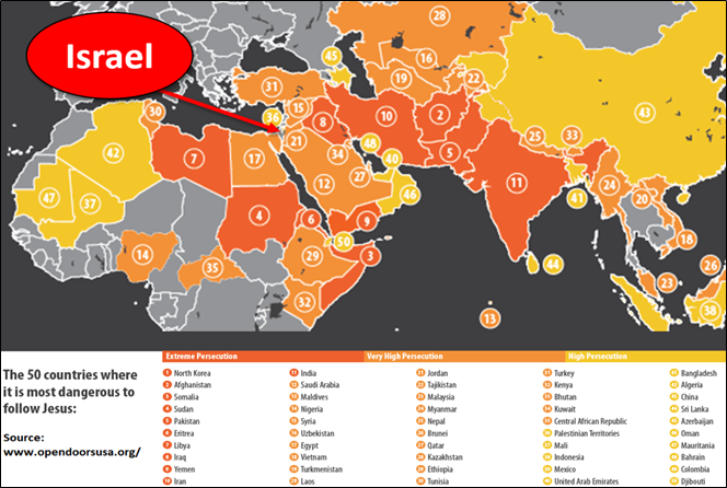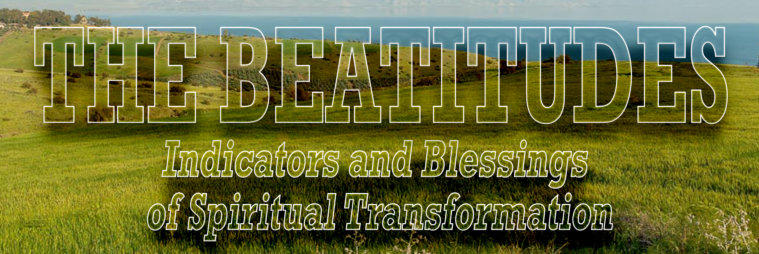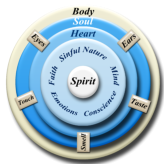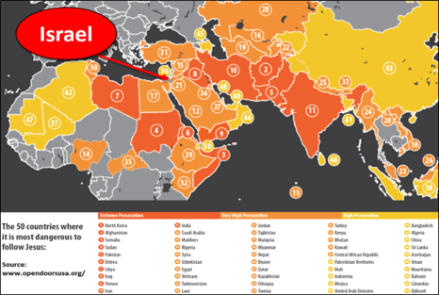
When
someone
has
a
true
encounter
with
God—they
are
forever
changed
from
within—because
the
light
of
God
(which enables us to spiritually see in the darkness) reveals reality and truth.
•
When
we
encounter
God
is
when
we
can
see
ourselves
clearly.
Imagine
for
a
moment
attempting
to
look
at
yourself
in
a
mirror
in
a
room
that
has
no
light.
This
scenario
defines
the
perception
of
those
who
are
living
in
spiritual
darkness.
However,
when
one
encounters
God,
His
light
no
only
illuminates
what’s
around
us,
His
light
also
illuminates
sin
that’s
embedded
within
our
heart
and
soul—which
results
in
sorrow,
humility
and
repentance.
•
When we encounter God
, earthly “things” that once seemed important quickly lose their “luster.” Earthly things
perceived
as
valuable
and
important
will
dramatically
change
as
we
realize
its
darkened
influence;
how
it
has
misdirected us from truth; and its utter uselessness from an eternal perspective.
•
When
we
encounter
God
is
when
we
begin
to
perceive
those
around
us
(and
the
world)
from
a
different
perspective—including the spiritual death of those who are bound by the lies of sin.
This
illuminative
insight
and
spiritual
changes
within
our
heart
and
soul
does
not
occur
naturally
within
humans.
It
only
occurs
within
a
willing
heart
and
by
the
workings
of
the
Holy
Spirit.
These
spiritual
changes
are
indicated
by
our
transformed
thoughts
and
behavior
as
we
become
more
like
Jesus.
This
transformation
is
called
sanctification:
to
be
set
apart
for
God’s
use,
purpose,
filled
with
His
spirit
and
made
holy.
Jesus
provided
indicators
of
spiritual
transformation
and
sanctification—including
the
associated
blessings—during
His
Sermon
on
the
Mount
(which
is
referred to as The Beatitudes).
The Beatitudes
The
word
beatitude
is
defined
as
blessedness:
being
blessed
with
divine
favor,
spiritual
prosperity
and
a
deep
joy
of
the
soul.
In
Matthew
5:1-10,
Jesus
taught
8
different
aspects
of
spirituality
that
result
in
blessedness.
It’s
important
to
note
the
Beatitudes
also
define
the
essence
of
Jesus
Christ—in
that
every
aspect
of
His
life
was
a
demonstration
of
what He desires for each of us—including the blessings.
In addition, when you think about it, each beatitude defines the antithesis (opposite) of Satan.
We
will
take
a
“deeper
dive”
into
each
Beatitude—because
the
world
does
not
understand
and
misinterprets
the
spirituality and blessings of each one.
Poor in Spirit
“Blessed are the poor in spirit, for theirs is the kingdom of heaven.” Matthew 5:3
Being
poor
in
spirit
has
nothing
to
do
with
the
lack
of
financial
wealth
or
possessions—because
none
of
these
have
eternal
value
(unless
they
are
used
for
the
glory
of
God).
But
rather,
the
word
poor
defines
a
state
of
spiritual
poverty:
an
“emptiness”
inside
compounded
by
an
inability
to
free
ourselves
from
a
sin-filled
and
dismal
situation.
This
occurs
when we realize one or more of the following:
•
We hate our sin; we want to change and we know we can’t do it alone.
•
We can no longer trust upon our personal abilities to cope with challenges in life.
•
We have reached a point where the only option is to let go and trust God.
•
Receiving
God’s
grace
(via
faith
in
the
sacrificial
death
of
His
Son
for
our
sins)—and
asking
Jesus
to
be
Lord
over our life—is the right answer to all of the wrongs in my life.
There
are
two
sides
to
spiritual
poverty.
On
one
side
it
is
emotionally
painful
as
we
face
the
truth
of
who
we
are,
what
we
have
done
and
the
consequences
of
our
actions.
On
the
other
side,
it
can
be
a
transitional
point
into
spiritual
blessings if we obey the guidance of the Holy Spirit.
Christians
will
also
experience
spiritual
poverty
for
periods
of
time
due
to
trials
and
tribulations.
These
are
times
when
we
are
faced
with
situations
that
challenge
the
very
foundations
of
our
faith.
As
the
turmoil
subsides,
we
find
ourselves
spiritually
stronger
due
to
the
experience.
In
addition,
a
little
less
of
ourselves
remain
(which
is
a
good
thing).
“And
we
know
that
all
things
work
together
for
good
to
those
who
love
God,
to
those
who
are
the
called
according
to
His purpose.” Romans 8:28
“We
also
glory
in
tribulations,
knowing
that
tribulation
produces
perseverance;
and
perseverance,
character;
and
character, hope.” Romans 5:3
“My
brethren,
count
it
all
joy
when
you
fall
into
various
trials,
knowing
that
the
testing
of
your
faith
produces
patience.
But let patience have its perfect work, that you may be perfect and complete, lacking nothing.” James 1:2-4
“In
this
you
greatly
rejoice,
though
now
for
a
little
while,
if
need
be,
you
have
been
grieved
by
various
trials,
that
the
genuineness
of
your
faith,
being
much
more
precious
than
gold
that
perishes,
though
it
is
tested
by
fire,
may
be
found
to praise, honor, and glory at the revelation of Jesus Christ.” 1 Peter 1:6-7
In
addition,
fleshly
pride
and
poor
in
spirit
are
mutually
exclusive.
In
other
words,
we
can
have
one
or
the
other,
but
not
both.
As
such,
we
are
deeply
mistaken
if
we
have
a
perception
that
God
is
lucky
to
have
us
(given
a
list
of
our
skills
and
accomplishments
in
life).
In
truth,
each
of
these
were
a
blessing
from
God—Who
alone
is
worthy
of
recognition
and
praise.
Besides,
what
can
we
offer
God
who
created
the
heavens
and
the
earth
and
has
no
need?
However,
because
God
gave
each
of
us
a
free
will,
the
most
important
thing
you
can
offer
Him
is
your
heart
(which
you own and what He desires).
Scriptural Examples of Poor in Spirit
In
each
example
below,
identify
the
source
that
illuminates
the
spiritual
poverty;
reflect
upon
the
corresponding
response; and determine how you would respond if this happened to you.
The
prophet
Isaiah
saw
the
Lord
on
His
throne,
the
train
of
His
robe,
and
angels
surrounding
Him
declaring
His
glory.
Isaiah
responded
by
saying
“Woe
is
me,
for
I
am
undone!
Because
I
am
a
man
of
unclean
lips,
And
I
dwell
in
the
midst
of
a
people
of
unclean
lips.”
Isaiah’s
encounter
with
God
quickly
changed
from
a
glorious
vision
of
the
Heavenlies, to the realization of his sin and the sin of those whom he dwells with. (See Isaiah 6:1-5)
When
Simon
Peter
saw
one
of
the
miracles
of
Jesus,
he
fell
down
before
Jesus
and
said
“Depart
from
me,
for
I
am
a
sinful man, O Lord.” Luke 5:8
Jacob
declared
“I
am
not
worthy
of
the
least
of
all
the
mercies
and
of
all
the
truth
which
You
have
shown
Your
servant.” Genesis 32:10
In
the
Parable
of
the
Lost
Son,
Jesus
provided
us
with
an
example
of
spiritual
poverty
via
a
comparison
between
God
and
man,
and
a
father
and
his
son.
Jesus
described
how
a
man’s
son
asks
for
his
inheritance,
leaves
the
family
and
squanders
all
of
it
on
prodigal
(wasteful,
reckless,
extravagant)
living.
Now
penniless
and
desperate
to
survive,
he
was
forced
to
eat
food
intended
for
pigs.
Eventually
he
realized
his
mistake,
humbled
himself,
and
determined
he
would
say
to
his
father
“I
have
sinned
against
heaven
and
before
you,
and
I
am
no
longer
worthy
to
be
called
your
son.
Make
me
one
of
your
hired
servants.”
However,
when
he
seen
by
his
father
walking
toward
him,
the
father
(like
God)
had
compassion,
ran
towards
him,
fell
on
his
neck
and
kissed
him.
The
son
said
“Father,
I
have
sinned
against
heaven
and
in
your
sight,
and
am
no
longer
worthy
to
be
called
your
son.”
Because
of
his
love
for
his
son,
the
father
forgave
all.
They
celebrated
because
his
son
once
was
dead
and
is
alive
again,
was
lost
and
is
now
found.
(See
Luke 15: 11-32)
Jesus
said
“Two
men
went
up
to
the
temple
to
pray,
one
a
Pharisee
and
the
other
a
tax
collector.
The
Pharisee
stood
and
prayed
thus
with
himself,
‘God,
I
thank
You
that
I
am
not
like
other
men—extortioners,
unjust,
adulterers,
or
even
as
this
tax
collector.
I
fast
twice
a
week;
I
give
tithes
of
all
that
I
possess.’
And
the
tax
collector,
standing
afar
off,
would
not
so
much
as
raise
his
eyes
to
heaven,
but
beat
his
breast,
saying,
‘God,
be
merciful
to
me
a
sinner!’
I
tell
you,
this
man
went
down
to
his
house
justified
rather
than
the
other;
for
everyone
who
exalts
himself
will
be
humbled,
and he who humbles himself will be exalted.” Luke 18:10-14
Blessedness of Poor in Spirit: The Kingdom of Heaven
The
Kingdom
of
Heaven
and
The
Kingdom
of
God
are
used
interchangeably
in
the
Bible
(one
and
the
same).
The
Kingdom
of
Heaven
exists
within
the
spiritual
realm.
It
is
where
God
reigns
as
king,
and
where
His
will
is
fulfilled
in
the hearts of those who are living, and for eternity.
From
a
perspective
of
those
who
are
living,
in
Matthew
chapter
13
Jesus
described
the
Kingdom
of
Heaven
as
a
valuable
hidden
treasure—something
that
when
one
discovers
it,
they
will
sell
all
that
they
have
to
possess
it.
From
a
perspective
of
eternity,
Jesus
said
“The
righteous
will
shine
forth
as
the
sun
in
the
kingdom
of
their
Father.”
Matthew
13:43
Mourning
“Blessed are those who mourn, for they will be comforted.” Matthew 5:4
God
uniquely
designed
humans
with
the
capacity
to
mourn,
and
is
one
of
the
varied
emotions
we
experience.
Mourning
is
commonly
defined
as
a
feeling
or
showing
deep
sorrow,
grief
and
regret.
However,
there
are
2
types
of
mourning: 1 occurs with physical death, the other with spiritual death.
1
.
We mourn when someone physically dies—which most people understand or have experienced.
2
.
When
God
illuminates
that
which
is
around
us
and
in
us,
we
will
mourn
when
we
see
the
spiritual
death
in
the
world,
spiritual
death
of
someone
we
know,
and
spiritual
death
of
whom
we
love.
We
ache
deep
inside
because
we
know
the
truth:
lies
have
shackled
them
to
their
sin.
This
type
of
mourning
is
reflected
by
our
heart-felt
fervent
prayers
and
weeping
for
the
lost.
We
also
mourn
because
of
our
own
sin—which
is
also
reflected
by
heart-felt fervent prayers, sorrow, regret and weeping as we confess our transgressions to our Lord.
Scriptural Examples of Spiritual Mourning
As
Jesus
was
approaching
Jerusalem
(on
Psalm
Sunday)—He
knew
they
were
going
to
reject
him
and
crucify
Him.
But
yet
He
wept
because
of
His
love
for
those
who
failed
to
understand
who
He
is
and
the
purpose
of
His
sacrificial
death
that
was
about
to
occur.
“Now
as
He
drew
near,
He
saw
the
city
and
wept
over
it,
saying,
‘If
you
had
known,
even you, especially in this your day, the things that make for your peace! Luke 19:41-42
Isaiah
prophesied
about
Jesus
Christ
700
years
before
He
lived.
What’s
more,
Jesus
knew
every
word
of
Isaiah’s
prophesy
and
what
was
set
before
Him:
dying
an
excruciating
death
on
the
cross
as
a
sacrifice
for
our
transgressions
so
that
we
may
be
set
free
from
sin
and
spiritual
death.
Isaiah
also
prophesied
Jesus
would
make
intercessory
prayer
for
those
who
crucified
him.
While
dying
on
the
cross
Jesus
said,
“Father,
forgive
them,
for
they
do
not
know
what
they do.” Luke 23:34
“He
is
despised
and
rejected
by
men,
a
Man
of
sorrows
and
acquainted
with
grief.
And
we
hid,
as
it
were,
our
faces
from
Him;
He
was
despised,
and
we
did
not
esteem
Him.
Surely
He
has
borne
our
griefs
and
carried
our
sorrows;
yet
we
esteemed
Him
stricken,
smitten
by
God,
and
afflicted.
But
He
was
wounded
for
our
transgressions,
He
was
bruised
for
our
iniquities;
the
chastisement
for
our
peace
was
upon
Him,
and
by
His
stripes
we
are
healed.
All
we
like
sheep
have
gone
astray;
we
have
turned,
every
one,
to
his
own
way;
and
the
Lord
has
laid
on
Him
the
iniquity
of
us
all.
He
was
oppressed
and
He
was
afflicted,
yet
He
opened
not
His
mouth;
He
was
led
as
a
lamb
to
the
slaughter,
and
as
a
sheep
before
its
shearers
is
silent,
so
He
opened
not
His
mouth.
He
was
taken
from
prison
and
from
judgment,
and
who
will
declare
His
generation?
For
He
was
cut
off
from
the
land
of
the
living;
for
the
transgressions
of
My
people
He
was
stricken.
And
they
made
His
grave
with
the
wicked—but
with
the
rich
at
His
death,
because
He
had
done
no
violence,
nor
was
any
deceit
in
His
mouth.
Yet
it
pleased
the
Lord
to
bruise
Him;
He
has
put
Him
to
grief.
When
You
make
His
soul
an
offering
for
sin,
He
shall
see
His
seed,
He
shall
prolong
His
days,
and
the
pleasure
of
the
Lord
shall
prosper
in
His
hand.
He
shall
see
the
labor
of
His
soul,
and
be
satisfied.
By
His
knowledge
My
righteous
Servant
shall
justify
many,
For
He
shall
bear
their
iniquities.
Therefore
I
will
divide
Him
a
portion
with
the
great,
and
He
shall
divide
the
spoil
with
the
strong,
because
He
poured
out
His
soul
unto
death,
and
He
was
numbered
with
the
transgressors,
and
He
bore
the
sin
of
many,
and
made
intercession
for
the
transgressors.”
Isaiah
53:3-12
Blessedness of Mourning: They Will Be Comforted
For
those
who
are
mourning,
there
is
comfort
in
knowing
God
is
still
in
control
and
He
reigns;
and
our
hope
will
be
fulfilled by Him and with Him in glory.
Jesus
said
“Most
assuredly,
I
say
to
you
that
you
will
weep
and
lament,
but
the
world
will
rejoice;
and
you
will
be
sorrowful,
but
your
sorrow
will
be
turned
into
joy.
A
woman,
when
she
is
in
labor,
has
sorrow
because
her
hour
has
come;
but
as
soon
as
she
has
given
birth
to
the
child,
she
no
longer
remembers
the
anguish,
for
joy
that
a
human
being
has
been
born
into
the
world.
Therefore
you
now
have
sorrow;
but
I
will
see
you
again
and
your
heart
will
rejoice, and your joy no one will take from you.” John 16:20-22
Jesus
said
“These
things
I
have
spoken
to
you,
that
in
Me
you
may
have
peace.
In
the
world
you
will
have
tribulation;
but be of good cheer, I have overcome the world.” John 16:33
“Now
I
saw
a
new
heaven
and
a
new
earth,
for
the
first
heaven
and
the
first
earth
had
passed
away.
Also
there
was
no
more
sea.
Then
I,
John,
saw
the
holy
city,
New
Jerusalem,
coming
down
out
of
heaven
from
God,
prepared
as
a
bride
adorned
for
her
husband.
And
I
heard
a
loud
voice
from
heaven
saying,
“Behold,
the
tabernacle
of
God
is
with
men,
and
He
will
dwell
with
them,
and
they
shall
be
His
people.
God
Himself
will
be
with
them
and
be
their
God.
And
God
will
wipe
away
every
tear
from
their
eyes;
there
shall
be
no
more
death,
nor
sorrow,
nor
crying.
There
shall
be
no
more
pain,
for
the
former
things
have
passed
away.
Then
He
who
sat
on
the
throne
said,
‘Behold,
I
make
all
things
new.’ And He said to me, ‘Write, for these words are true and faithful.’” Revelation 21:1-5
Meekness
“Blessed are the meek, for they will inherit the earth.” Matthew 5:5
The
world
views
meekness
as
an
undesirable
personality
flaw.
If
you
randomly
asked
a
group
of
persons
to
define
a
meek person, you would likely hear the following words in their response:
•
Quiet and unwilling to disagree or fight to support their personal ideas and opinions.
•
Easily influenced and manipulated.
•
Lacks spirit and courage.
•
Submissive, timid, spineless, docile and weak.
However,
from
a
spiritual
perspective,
Jesus
Christ
demonstrated
a
completely
different
form
of
meekness
when
you
consider who He was and how He demonstrated His divine power (via miracles).
“Let
this
mind
be
in
you
which
was
also
in
Christ
Jesus,
who,
being
in
the
form
of
God,
did
not
consider
it
robbery
to
be
equal
with
God,
but
made
Himself
of
no
reputation,
taking
the
form
of
a
bondservant,
and
coming
in
the
likeness
of
men.
And
being
found
in
appearance
as
a
man,
He
humbled
Himself
and
became
obedient
to
the
point
of
death,
even
the
death
of
the
cross.
Therefore
God
also
has
highly
exalted
Him
and
given
Him
the
name
which
is
above
every
name,
that
at
the
name
of
Jesus
every
knee
should
bow,
of
those
in
heaven,
and
of
those
on
earth,
and
of
those
under
the
earth,
and
that
every
tongue
should
confess
that
Jesus
Christ
is
Lord,
to
the
glory
of
God
the
Father.”
Philippians 2:5-11
When
Jesus
was
being
arrested
in
the
Garden
of
Gethsemane,
someone
one
who
was
with
Jesus
drew
his
sword
and
cut
off
the
ear
of
a
servant
of
the
high
priest.
The
response
by
Jesus
revealed
His
divinely
accessible
power
when
He
said
“Put
your
sword
in
its
place,
for
all
who
take
the
sword
will
perish
by
the
sword.
Or
do
you
think
that
I
cannot now pray to My Father, and He will provide Me with more than twelve legions of angels?” Matthew 26:52-53
Jesus,
the
most
powerful
person
to
ever
walk
on
earth,
had
both
the
right
and
the
ability
to
change
the
outcome.
However,
for
the
sake
of
all
who
believe—so
that
His
body
would
become
a
perfect
sacrifice
for
our
sins—He
willingly
submitted to those who would convict and crucify Him for a crime He did not commit.
“He
was
oppressed
and
He
was
afflicted,
yet
He
opened
not
His
mouth;
He
was
led
as
a
lamb
to
the
slaughter,
and
as a sheep before its shearers is silent, so He opened not His mouth.” Isaiah 53:7
True spiritual meekness:
•
Is a determination to not inflate our own self-estimation.
•
Is being humble toward God.
•
Expresses humility and respect toward others.
•
Demonstrates power under control.
•
Reflects Jesus Christ by willingly letting go of our rights for the benefit of others.
•
Helps us more effectively share the gospel of Jesus Christ with others.
“Always
be
ready
to
give
a
defense
to
everyone
who
asks
you
a
reason
for
the
hope
that
is
in
you,
with
meekness
and fear.” 1 Peter 3:15
Blessedness of Meekness: They Will Inherit the Earth
From
a
human
standpoint,
most
of
us
desire
to
pass
on
our
assets
to
our
children
when
we
die
(because
of
our
love
for
our
children).
Whatever
is
ours
will
become
theirs
(as
a
gift)
to
enjoy
upon
our
death.
As
such,
from
a
similar
and
spiritual perspective, Jesus Christ died on the cross so that we can:
•
Be view by God as having the righteousness of Jesus because of our faith.
o
“And
be
found
in
Him,
not
having
my
own
righteousness,
which
is
from
the
law,
but
that
which
is
through
faith in Christ, the righteousness which is from God by faith.” Philippians 3:9
o
“But
to
him
who
does
not
work
but
believes
on
Him
who
justifies
the
ungodly,
his
faith
is
accounted
for
righteousness. Romans 4:5
•
Become heirs to all He owns.
o
“The
Spirit
Himself
bears
witness
with
our
spirit
that
we
are
children
of
God,
and
if
children,
then
heirs—heirs of God and joint heirs with Christ.” Romans 8:16-18
o
“Who
according
to
His
abundant
mercy
has
begotten
us
again
to
a
living
hope
through
the
resurrection
of
Jesus
Christ
from
the
dead,
to
an
inheritance
incorruptible
and
undefiled
and
that
does
not
fade
away,
reserved in heaven for you.” 1 Peter 1:3-4
Note:
I
had
difficulty
in
determining
what
Jesus
meant
by
stating
“They
will
inherit
the
earth.”
During
my
research
I
found
a
variety
of
opinions
of
its
meaning
that
seem
relevant.
However,
I
did
not
feel
“comfortable”
with
what
I
found.
Besides,
given
what’s
going
on
in
the
earth
and
its
present
condition,
why
would
anyone
want
to
inherit
it?
It’s
similar
to
inheriting
a
useless,
rusted,
broken
down,
and
completely
trashed
automobile.
And
yes,
there
is
absolute
beauty
on
earth,
but
this
is
overshadowed
by
darkness
and
sin
caused
by
the
workings
of
the
ruler,
prince,
and
god
of
this
age: Satan.
So,
after
prayer
and
listening,
I
felt
compelled
to
write
the
following
explanation
using
a
logical
approach
and
scripture
to
support
the
logic.
Please
understand
my
interpretation
is
an
opinion—which
you
may
accept
or
reject.
Besides,
if
anything, it causes us to think about God’s word and what will occur in the future—which is beneficial to all.
So,
is
the
earth
worth
inheriting?
My
answer
is
absolutely
yes.
However,
it
first
requires
removal
of
the
present
“landlord”
(Satan)—and
the
absolute
control
by
Jesus—to
achieve
its
full
potential.
Here
are
scriptural
examples
of
Satan’s present role and influence in the world, plus his pending judgment.
After
Jesus
spent
40
days
and
nights
in
the
wilderness
fasting,
Satan
(in
an
attempt
to
cause
Jesus
to
relinquish
his
God-given
authority
and
power)
tempted
Him
to
sin
in
various
ways.
For
each
attempt
Jesus
responded
with
God’s
word
to
overcome
the
influential
lies
of
Satan.
What’s
revealing,
Satan
offered
Jesus
the
world
if
He
would
worship
him.
“Again,
the
devil
took
Him
up
on
an
exceedingly
high
mountain,
and
showed
Him
all
the
kingdoms
of
the
world
and
their
glory.
And
he
said
to
Him,
‘All
these
things
I
will
give
You
if
You
will
fall
down
and
worship
me.’”
Jesus
responded
“Away
with
you,
Satan!
For
it
is
written,
‘You
shall
worship
the
Lord
your
God,
and
Him
only
you
shall
serve.’”
Matthew 4:8-10
Paul
revealed
who’s
responsible
for
the
blinding
of
eyes
from
truth.
“But
even
if
our
gospel
is
veiled,
it
is
veiled
to
those
who
are
perishing,
whose
minds
the
god
of
this
age
has
blinded,
who
do
not
believe,
lest
the
light
of
the
gospel
of the glory of Christ, who is the image of God, should shine on them.” 2 Corinthians 4:3-4
Jesus
provided
insight
into
His
divine
judgmental
authority;
what
will
occur
in
the
future
to
the
ruler
of
the
world;
and
how
His
death
on
the
cross
will
draw
people
to
Him.
“Now
is
the
judgment
of
this
world;
now
the
ruler
of
this
world
will
be cast out. And I, if I am lifted up from the earth, will draw all peoples to Myself.” John 12:31-32
Prior
to
His
arrest
and
death
on
the
cross,
Jesus
said
“I
will
no
longer
talk
much
with
you,
for
the
ruler
of
this
world
is
coming, and he has nothing in Me.” John 14:30
Jesus
said
“But
now
I
go
away
to
Him
who
sent
Me,
and
none
of
you
asks
Me,
‘Where
are
You
going?’
But
because
I
have
said
these
things
to
you,
sorrow
has
filled
your
heart.
Nevertheless
I
tell
you
the
truth.
It
is
to
your
advantage
that
I
go
away;
for
if
I
do
not
go
away,
the
Helper
will
not
come
to
you;
but
if
I
depart,
I
will
send
Him
to
you.
And
when
He
has
come,
He
will
convict
the
world
of
sin,
and
of
righteousness,
and
of
judgment:
of
sin,
because
they
do
not
believe
in
Me;
of
righteousness,
because
I
go
to
My
Father
and
you
see
Me
no
more;
of
judgment,
because
the
ruler
of this world is judged.” John 16:5-11
Since
the
time
Satan
was
cast
to
earth
(because
of
the
rebellion
in
Heaven),
God
has
given
Satan
“restrictive
privileges”
to
influence
those
who
are
living
on
earth.
However,
his
ability
to
influence
will
become
increasingly
unrestrained
during
the
last
days;
and
will
come
to
an
abrupt
end
when
Jesus
returns,
destroys
the
Beast’s
(Satan’s)
armies,
and
begins
His
millennial
reign
on
earth.
What’s
more,
Satan
will
be
cast
into
the
Abyss
(bottomless
pit)—which will be the first time Satan will be unable to influence those upon earth.
“Then
I
saw
an
angel
coming
down
from
heaven,
having
the
key
to
the
bottomless
pit
and
a
great
chain
in
his
hand.
He
laid
hold
of
the
dragon,
that
serpent
of
old,
who
is
the
Devil
and
Satan,
and
bound
him
for
a
thousand
years;
and
he
cast
him
into
the
bottomless
pit,
and
shut
him
up,
and
set
a
seal
on
him,
so
that
he
should
deceive
the
nations
no
more
till
the
thousand
years
were
finished.
But
after
these
things
he
must
be
released
for
a
little
while.”
Revelation
20:1-3
When
Jesus
Christ
begins
His
millennial
reign
is
when
God’s
promise
to
Abraham
and
the
Israelites
will
be
fulfilled,
and
when
the
earth
will
become
a
desirable
inheritance.
Jesus
Christ—the
Messiah
and
Anointed
King—will
reign
from His throne over the earth and all of its inhabitants.
It’s
important
to
note
that
those
who
are
living
during
this
thousand-year
period
will
have
the
same
sinful
nature
we
have.
However,
things
will
be
much
different
when
you
consider
the
absolute
rule
of
Jesus
Christ,
and
the
elimination
of Satan and his lies.
Jesus Christ will:
Jesus Christ will employ a hierarchical structure of power and control.
Global peace will occur.
Worship
Daily life
“He
shall
judge
between
the
nations,
and
rebuke
many
people;
they
shall
beat
their
swords
into
plowshares,
and
their
spears
into
pruning
hooks;
nation
shall
not
lift
up
sword
against
nation,
neither
shall
they
learn
war
anymore.”
Isaiah
2:4
“The
wolf
also
shall
dwell
with
the
lamb,
the
leopard
shall
lie
down
with
the
young
goat,
the
calf
and
the
young
lion
and
the
fatling
together;
and
a
little
child
shall
lead
them.
The
cow
and
the
bear
shall
graze;
their
young
ones
shall
lie
down
together;
and
the
lion
shall
eat
straw
like
the
ox.
The
nursing
child
shall
play
by
the
cobra’s
hole,
and
the
weaned
child
shall
put
his
hand
in
the
viper’s
den.
They
shall
not
hurt
nor
destroy
in
all
My
holy
mountain,
for
the
earth shall be full of the knowledge of the Lord as the waters cover the sea.” Isaiah 11:6-9
The
above
scripture
depicts
no
war;
harmony
between
man
and
animals;
Jesus
Christ
as
Lord
over
all;
and
a
type
of
life
we
envision
as
perfect.
However,
God’s
plan
for
our
inheritance
is
more,
much
more:
a
new
heaven
and
a
new
earth. For the earth that we presently live upon will pass away.
“Now
I
saw
a
new
heaven
and
a
new
earth,
for
the
first
heaven
and
the
first
earth
had
passed
away.
Also
there
was
no
more
sea.
Then
I,
John,
saw
the
holy
city,
New
Jerusalem,
coming
down
out
of
heaven
from
God,
prepared
as
a
bride
adorned
for
her
husband.
And
I
heard
a
loud
voice
from
heaven
saying,
‘Behold,
the
tabernacle
of
God
is
with
men,
and
He
will
dwell
with
them,
and
they
shall
be
His
people.
God
Himself
will
be
with
them
and
be
their
God.
And
God
will
wipe
away
every
tear
from
their
eyes;
there
shall
be
no
more
death,
nor
sorrow,
nor
crying.
There
shall
be
no
more
pain,
for
the
former
things
have
passed
away.’
Then
He
who
sat
on
the
throne
said,
‘Behold,
I
make
all
things
new.’
And
He
said
to
me,
‘Write,
for
these
words
are
true
and
faithful.’
And
He
said
to
me,
‘It
is
done!
I
am
the
Alpha
and
the
Omega,
the
Beginning
and
the
End.
I
will
give
of
the
fountain
of
the
water
of
life
freely
to
him
who
thirsts.
He
who overcomes shall inherit all things, and I will be his God and he shall be My son. Revelation 21:1-7
Jesus
said
the
meek
shall
inherit
the
earth.
Did
Jesus
mean
the
earth
during
His
millennial
Reign,
or
the
new
heaven
and new earth, or both? Those who overcome will inherit all things and will know the answer.
Hunger and Thirst for Righteousness
“Blessed are those who hunger and thirst for righteousness, for they will be filled.” Matthew 5:6
Jesus
did
not
speak
about
our
need
for
food
or
drink.
But
rather,
Jesus
correlated
our
physical
hunger
and
thirst
with
our spiritual cravings for righteousness and voids within our heart and soul that only He can fill. Jesus proclaimed:
•
“I
am
the
bread
of
life.
He
who
comes
to
Me
shall
never
hunger,
and
he
who
believes
in
Me
shall
never
thirst.”
John 6:35
•
“If
anyone
thirsts,
let
him
come
to
Me
and
drink.
He
who
believes
in
Me,
as
the
Scripture
has
said,
out
of
his
heart will flow rivers of living water.” John7:37-38
God
designed
us
with
a
free
will—because
He
wants
each
of
us
to
make
a
self-determination
to
seek
Him.
We
all
have
the
choice
to
fulfill
the
lusts
of
our
flesh,
or
seek
the
righteousness
of
God.
Those
who
choose
to
fulfill
their
lusts
will experience the darkened consequences of the lies.
Now
the
works
of
the
flesh
are
evident,
which
are:
adultery,
fornication,
uncleanness,
lewdness,
idolatry,
sorcery,
hatred,
contentions,
jealousies,
outbursts
of
wrath,
selfish
ambitions,
dissensions,
heresies,
envy,
murders,
drunkenness,
revelries,
and
the
like;
of
which
I
tell
you
beforehand,
just
as
I
also
told
you
in
time
past,
that
those
who
practice such things will not inherit the kingdom of God. Galatians 5:19-21
However,
there
are
those
who
realize
the
continual
emptiness
of
trying
to
fill
and
refill
the
voids
within
our
heart
and
soul
with
lies,
develop
a
hatred
for
their
sin,
and
become
tired
of
its
control
and
consequences.
In
lieu
of
desiring
to
fulfill
the
flesh,
they
begin
to
desire
(hunger
and
thirst
for)
righteousness,
and
they
begin
to
seek
truth.
Jesus
said
“I
am the way, the truth, and the life. No one comes to the Father except through Me.” John 14:6
There
are
two
aspects
of
righteousness.
The
first
is
imputed
to
us
by
our
faith
in
Jesus
Christ.
The
second
is
transformational righteousness as the grace of God changes us from within.
When
someone
places
their
faith
in
what
Jesus
Christ
did
for
us
on
the
cross,
and
accepts
Him
as
Savior
and
Lord—they
will
be
viewed
by
God
as
having
imputed
righteousness
(attributed,
credited,
assigned)—as
having
the
same righteousness of Jesus.
“For
by
grace
you
have
been
saved
through
faith,
and
that
not
of
yourselves;
it
is
the
gift
of
God,
not
of
works,
lest
anyone
should
boast.
For
we
are
His
workmanship,
created
in
Christ
Jesus
for
good
works,
which
God
prepared
beforehand that we should walk in them.” Ephesians 2:8-9
No one by their “works” and perceived self-righteousness is acceptable to God.
•
“But we are all like an unclean thing, and all our righteousnesses are like filthy rags.” Isaiah 64:6
•
“There is none righteous, no, not one.” Romans 3:10
Consider
the
pride
and
boasting
in
Heaven
if
entrance
was
based
upon
works.
“Yep,
here
I
am.
Look
at
all
that
I
did.
Now,
where’s
my
rewards!”
As
opposed
to
a
humble
heart;
thanking
and
praising
Jesus
who
died
for
the
sins
we
committed—for
we
were
unworthy
of
God’s
grace
and
mercy—as
we
lay
at
His
feet
any
accomplishments
we
may
have achieved in our life.
Our
righteousness
is
imputed
to
us
based
upon
our
faith
in
God
and
His
grace
extended
to
us
by
His
Son,
Jesus
Christ.
There
are
no
works,
process,
list
of
behaviors
one
must
achieve,
and
so
forth
that
is
acceptable
to
God.
Faith
in His Son is the key to be viewed by God as being righteous.
“Just as Abraham believed God, and it was accounted to him for righteousness.” Galatians 3:6
“But
now
the
righteousness
of
God
apart
from
the
law
is
revealed,
being
witnessed
by
the
Law
and
the
Prophets,
even
the
righteousness
of
God,
through
faith
in
Jesus
Christ,
to
all
and
on
all
who
believe.
For
there
is
no
difference;
for
all
have
sinned
and
fall
short
of
the
glory
of
God,
being
justified
freely
by
His
grace
through
the
redemption
that
is
in
Christ
Jesus,
whom
God
set
forth
as
a
propitiation
by
His
blood,
through
faith,
to
demonstrate
His
righteousness,
because
in
His
forbearance
God
had
passed
over
the
sins
that
were
previously
committed,
to
demonstrate
at
the
present
time
His
righteousness,
that
He
might
be
just
and
the
justifier
of
the
one
who
has
faith
in
Jesus.”
Romans
3:21-26
Blessedness of Hunger and Thirst for Righteousness: Sanctification
The
second
aspect
of
righteousness
is
the
transformation
that
occurs
within
our
heart
and
soul
by
the
power
of
God’s
grace.
Over
time
we
become
more
like
Jesus
and
less
like
ourselves
as
we
mirror
the
image
of
our
Savior.
This
process is referred to as sanctification.
•
“My
son,
do
not
despise
the
chastening
of
the
Lord,
nor
detest
His
correction;
For
whom
the
Lord
loves
He
corrects, just as a father the son in whom he delights. Proverbs 3:11-12
•
“Behold,
happy
is
the
man
whom
God
corrects;
therefore
do
not
despise
the
chastening
of
the
Almighty.”
Job
5:17
•
Jesus said
“As many as I love, I rebuke and chasten. Therefore be zealous and repent.” Revelation 3:19
•
“And those who are Christ’s have crucified the flesh with its passions and desires.” Galatians 5:24
Each
time
we
sin
it
causes
guilt
and
shame
in
our
hearts
and
souls
as
we
individually
think
“How
could
I
behave
in
such
a
way
that
disobeys
God’s
desire
for
me?
I
know
the
sin
is
based
upon
a
lie;
I’ve
been
there
before;
and
the
short-lived
experience
does
not
outweigh
how
I
feel
afterwards.”
This
horrible
feeling
is
God’s
spiritual
chastisement.
Once
we
humble
ourselves,
pray
and
ask
for
forgiveness,
we
begin
to
feel
the
weight
of
the
oppressive
feeling
beginning
to
lift
as
we
realize
we
are
forgiven.
“As
far
as
the
east
is
from
the
west,
so
far
has
He
removed
our
transgressions from us.” Psalm 103:12
It
is
God’s
grace,
love
and
forgiveness—enabled
by
the
death
and
blood
shed
by
Jesus
on
the
cross—that
changes
us
from
within.
But
what’s
more,
each
time
we
fail,
recover
by
His
grace
and
continue
to
walk
towards
Him,
it
creates
within us a life that is closer to the righteousness that has been imputed to us.
This
transformational
evidence
of
being
filled
with
the
righteousness
of
Jesus
is
evidenced
by
the
fruit
of
the
Spirit
and
by the crucifixion of our flesh.
•
But
the
fruit
of
the
Spirit
is
love,
joy,
peace,
longsuffering,
kindness,
goodness,
faithfulness,
gentleness,
self-
control.
Against
such
there
is
no
law.
And
those
who
are
Christ’s
have
crucified
the
flesh
with
its
passions
and
desires. Galatians 5:22-24
•
“Casting
down
arguments
and
every
high
thing
that
exalts
itself
against
the
knowledge
of
God,
bringing
every
thought into captivity to the obedience of Christ.” 2 Corinthians 10:5
Merciful
“Blessed are the merciful, for they will be shown mercy. Matthew 5:7
Merciful is defined as:
•
Treating people with kindness and forgiveness.
•
Not being cruel or harsh.
•
Withholding punishment (for those who deserve it).
“Let
no
corrupt
word
proceed
out
of
your
mouth,
but
what
is
good
for
necessary
edification,
that
it
may
impart
grace
to
the
hearers.
And
do
not
grieve
the
Holy
Spirit
of
God,
by
whom
you
were
sealed
for
the
day
of
redemption.
Let
all
bitterness,
wrath,
anger,
clamor,
and
evil
speaking
be
put
away
from
you,
with
all
malice.
And
be
kind
to
one
another,
tenderhearted, forgiving one another, even as God in Christ forgave you.” Ephesians 4:29-32
In
truth
and
reality,
it
is
difficult
at
times
to
not
become
frustrated
and
angry
at
others
for
their
behavior.
There
are
times
when
we
can
reach
a
point
where
we
want
to
vent
the
internal
pressure
by
speaking
caustic
words
and
reacting
in
ways
that
we
know
are
against
God’s
will,
and
will
only
make
things
worse.
However,
this
is
where
the
“rubber
meets
the
road.”
This
is
when
we
must
take
control
over
our
pride;
hold
onto
our
faith;
focus
upon
our
spiritual
desire
to
reach
someone
who
is
lost
and
in
darkness;
and
not
allow
our
sinful
nature,
emotions
and
flesh
to
control
the
situation.
It is helpful to think about God’s grace and mercy towards us when we are in this type of situation.
•
Grace is a gift from God that we will never deserve.
•
Mercy is not receiving the punishment we do deserve.
•
Both grace and mercy are blessings associated with being forgiven because of our faith in His Son.
Jesus
said
“For
if
you
forgive
men
their
trespasses,
your
heavenly
Father
will
also
forgive
you.
But
if
you
do
not
forgive men their trespasses, neither will your Father forgive your trespasses.” Matthew 6:14-15
How
can
we
receive
forgiveness
from
God
when
we
will
not
express
forgiveness
towards
others?
For
those
who
have
received
and
experienced
the
grace
and
mercy
of
God
know
of
its
transforming
power.
As
such,
we
need
to
reciprocate
by
mirroring
His
grace
and
mercy
(in
the
form
of
forgiveness)
toward
others.
Holding
onto
unforgiveness
can
become
an
overwhelming
“weight”
and
emotional
burden
upon
our
heart
and
soul;
and
it
will
separate
us
from
an
intimate relationship with God.
Being
merciful
is
supported
by
the
beatitudes
of
being
poor
in
spirit,
mourning
for
their
sin
and
darkness,
being
meek
by withholding retribution, and a deep desire to reflect the righteousness of Jesus Christ.
Blessedness of Mercy: We Will be Shown Mercy
Being
merciful
towards
someone—who
does
not
deserve
our
mercy—opens
the
blessings
of
receiving
mercies
from
God. This is when we are able to:
•
Release ourselves from the negative consequences of unforgiveness.
•
Not
struggle
with
the
difficulties
and
challenges
of
anger
management
(as
we
bit
e
our
tongue,
beat
our
head
against a wall, and regurgitate the scenario over and over again in our mind).
•
Experience the indescribable peace and joy of God deep within our soul.
•
Recover from the pain and emotional scars.
If
you
are
harboring
unforgiveness,
please
read
the
“Power
of
Forgiveness”
on
the
website.
When
we
truly
forgive
someone
for
who
they
are
and/or
what
they
have
done,
it
frees us from the debilitating shackles and bonds of unforgiveness.
Pure in Heart
“Blessed are the pure in heart, for they shall see God.” Matthew 5:8
The
heart
Jesus
refers
to
is
our
spiritual
heart
and
not
our
physical
heart.
What’s
more,
our
heart
is
a
critical
component of who we are and what we do, and is more important that we realize.
Words that may be used to describe a pure heart include:
•
Uncontaminated and cleansed by the blood of Jesus.
•
Lacks stained consequences and internal scars caused by sin.
•
Void of pride, anger, hypocrisy, guile, caustic words, and self-centered motives.
•
Indicators, such as transparency and a compelling desire to please God.
However,
if
you
were
asked
to
identify
anyone
you
know
that
meets
all
of
the
above
words
to
describe
their
pure
heart…there is a good chance you would have difficulty finding one person—especially ourselves!
Jesus
said
“What
comes
out
of
a
man,
that
defiles
a
man.
For
from
within,
out
of
the
heart
of
men,
proceed
evil
thoughts,
adulteries,
fornications,
murders,
thefts,
covetousness,
wickedness,
deceit,
lewdness,
an
evil
eye,
blasphemy, pride, foolishness. All these evil things come from within and defile a man.” Mark 7:20-23
Jesus
said
“A
good
man
out
of
the
good
treasure
of
his
heart
brings
forth
good;
and
an
evil
man
out
of
the
evil
treasure of his heart brings forth evil. For out of the abundance of the heart his mouth speaks.” Luke 6:45
“The heart is deceitful above all things, and desperately wicked.” Jeremiah 17:9
Cleansing of our heart begins:
1
.
When we realize it’s filled with unrighteous impurities.
2
.
We turn to God and:
a
.
Confess our sins.
b
.
Pray
“Create in me a clean heart, O God, and renew a steadfast spirit within me.” Psalms 51:10
“But
if
we
walk
in
the
light
as
He
is
in
the
light,
we
have
fellowship
with
one
another,
and
the
blood
of
Jesus
Christ
His
Son
cleanses
us
from
all
sin.
If
we
say
that
we
have
no
sin,
we
deceive
ourselves,
and
the
truth
is
not
in
us.
If
we
confess
our
sins,
He
is
faithful
and
just
to
forgive
us
our
sins
and
to
cleanse
us
from
all
unrighteousness.”
1
John
1:7-
9
Cleansing
of
our
heart
is
critical
for
sanctification.
Jesus
described
this
process
by
comparing
how
a
vinedresser
will
remove branches that do not produce fruit—and will prune productive branches to grow more fruit.
Jesus
said
“I
am
the
true
vine,
and
My
Father
is
the
vinedresser.
Every
branch
in
Me
that
does
not
bear
fruit
He
takes
away;
and
every
branch
that
bears
fruit
He
prunes,
that
it
may
bear
more
fruit.
You
are
already
clean
because
of
the
word
which
I
have
spoken
to
you.
Abide
in
Me,
and
I
in
you.
As
the
branch
cannot
bear
fruit
of
itself,
unless
it
abides
in
the
vine,
neither
can
you,
unless
you
abide
in
Me.
I
am
the
vine,
you
are
the
branches.
He
who
abides
in
Me,
and
I
in
him,
bears
much
fruit;
for
without
Me
you
can
do
nothing.
If
anyone
does
not
abide
in
Me,
he
is
cast
out
as
a
branch
and
is
withered;
and
they
gather
them
and
throw
them
into
the
fire,
and
they
are
burned.
If
you
abide
in
Me,
and
My
words
abide
in
you,
you
will
ask
what
you
desire,
and
it
shall
be
done
for
you.
By
this
My
Father
is
glorified,
that you bear much fruit; so you will be My disciples.” John 15:1-8
Blessedness of Pure in Heart: They Shall See God
The promise of Jesus refers to a time in the future when God will dwell amongst those He loves.
“Behold,
the
tabernacle
of
God
is
with
men,
and
He
will
dwell
with
them,
and
they
shall
be
His
people.
God
Himself
will
be
with
them
and
be
their
God.
And
God
will
wipe
away
every
tear
from
their
eyes;
there
shall
be
no
more
death,
nor sorrow, nor crying. There shall be no more pain, for the former things have passed away.’ Revelation 21:3-4
Meanwhile, while we are still living in our physical bodies on earth:
•
“Delight yourself also in the Lord, and He shall give you the desires of your heart.” Psalm 37:4
•
“Trust in the Lord with all your heart, and lean not on your o
wn understanding.” Prov
erbs 3:5
For
more
information
on
the
importance
of
our
heart,
read
“Body,
Soul,
Heart
and
Spirit,”
and
“God’s
Grace
and
the
Hardened
Heart.” Both are available on
UniqueBibleStudies.com
.
Peacemakers
“Blessed are the peacemakers, for they shall be called sons of God.” Matthew 5:9
“But
the
wisdom
that
is
from
above
is
first
pure,
then
peaceable,
gentle,
willing
to
yield,
full
of
mercy
and
good
fruits,
without
partiality
and
without
hypocrisy.
Now
the
fruit
of
righteousness
is
sown
in
peace
by
those
who
make
peace.”
James 3:17-18
A
peacemaker
is
one
who
influences
harmony
and
peace
within
individuals
and
between
persons.
Although
a
peacemaker
is
not
one
of
the
5
ministry
gifts
listed
in
Ephesians
4:11
(apostle,
prophet,
evangelist,
pastor,
and
teacher),
all
Christians
may
encounter
an
opportunity
to
be
a
peacemaker.
This
becomes
more
evident
when
you
consider:
•
The amount of uncertainty, chaos, turmoil, and conflict that exists throughout the world.
•
There has been a continued decline in peaceful coexistence between people.
•
There is has been an increase of stressful tension, anxiety and fear experienced by many.
•
Every
war,
every
battle,
every
skirmish,
every
murder,
every
argument,
every
caustic
word
spoken,
and
every
sin—began as a lie and culminated in spiritual death (separation from God) and/or physical death.
Satan’s
lies
are
designed
to
eliminate
peace
via
sin,
and
by
intensifying
the
consequences
of
sin:
division,
destruction,
devastation,
darkness,
desolation,
death,
and
eternal
damnation.
Whereas,
a
peacemaker
has
the
opportunity
to
share
the
only
true
source
of
peace:
a
complete
and
absolute
forgiveness
of
sins.
For
there
is
hope
for
those who:
•
Are unaware they are controlled by sin, and are separated from a relationship with God.
•
Forgot what it was like to live without internal consequences of sin (i.e. anxiety, fear, anger).
•
Desire improved harmony and a peaceful existence within themselves and with others.
•
Realize there must be something better—because what they’re doing is not working.
Jesus
said
“Peace
I
leave
with
you,
My
peace
I
give
to
you;
not
as
the
world
gives
do
I
give
to
you.
Let
not
your
heart
be troubled, neither let it be afraid.” John 14:27
“Be
anxious
for
nothing,
but
in
everything
by
prayer
and
supplication,
with
thanksgiving,
let
your
requests
be
made
known
to
God;
and
the
peace
of
God,
which
surpasses
all
understanding,
will
guard
your
hearts
and
minds
through
Christ Jesus.” Philippians 4:6-7
This
indescribable
peace
occurs
as
a
result
of
someone
hearing,
receiving
and
believing
in
the
Gospel
of
Jesus
Christ.
The Gospel of Jesus Christ
Gospel
means
“good
news.”
So
the
gospel
of
Jesus
Christ
is
the
good
news
that
He
provided
a
means
for
the
forgiveness
of
sins
for
all
who
believe.
Jesus
Christ—who
lived
a
sinless
life—died
on
the
cross
and
shed
His
blood
as the one and only, worthy and perfect sacrifice to God as an atonement for our sins.
For we are all sinners in desperate need of forgiveness, and a restoration of our relationship with God.
“For the wages of sin is death, but the gift of God is eternal life in Christ Jesus our Lord.” Romans 6:23
Jesus
said
“For
God
so
loved
the
world
that
He
gave
His
only
begotten
Son,
that
whoever
believes
in
Him
should
not
perish
but
have
everlasting
life.
For
God
did
not
send
His
Son
into
the
world
to
condemn
the
world,
but
that
the
world
through Him might be saved.” John 3:16-17
“If
you
confess
with
your
mouth
the
Lord
Jesus
and
believe
in
your
heart
that
God
has
raised
Him
from
the
dead,
you
will be saved.” Romans 10:9
Jesus
said
“I
am
the
resurrection
and
the
life.
He
who
believes
in
Me,
though
he
may
die,
he
shall
live.
And
whoever
lives and believes in Me shall never die.” John 11:25-26
Jesus said
“I am the way, the truth, and the life. No one comes to the Father except through Me.” John 14:6
Those
who
place
their
hope,
belief,
faith,
and
trust
in
Jesus
Christ—in
what
He
did
for
us
on
the
cross—are
forgiven
for their sins and are justified: blameless, vindicated and acceptable to God.
“Being
justified
freely
by
His
grace
through
the
redemption
that
is
in
Christ
Jesus,
whom
God
set
forth
as
a
propitiation
by
His
blood,
through
faith,
to
demonstrate
His
righteousness,
because
in
His
forbearance
God
had
passed
over
the
sins
that
were
previously
committed,
to
demonstrate
at
the
present
time
His
righteousness,
that
He
might
be
just
and
the justifier of the one who has faith in Jesus.” Romans 3:24-26
Sharing the Gospel of Jesus Christ
Telling
others
about
Jesus
Christ
should
not
be
a
mandatory
obligation
or
compulsory
requirement
of
being
a
Christian.
But
rather,
sharing
should
be
based
upon
a
compelling
influence
from
the
Holy-Spirit,
and
a
love
and
compassion
for
someone
who
is
lost.
When
this
occurs
there
is
an
indescribable
feeling
that
overwhelms
and
blesses
you
as
you
speak
life
and
truth
into
one
who
is
spiritually
dead
because
of
lies.
In
addition,
when
led
by
the
Holy
Spirit,
words
seem
to
flow
from
your
innermost
being.
For
Jesus
said
“He
who
believes
in
Me,
as
the
Scripture
has
said, out of his heart will flow rivers of living water.” John 7:38
When
sharing
the
Gospel
of
Jesus
Christ
it
is
important
to
remember
what
we
were
like
before
we
accepted
Jesus
Christ as our Savior and Lord. For example:
•
We were driven by our self-centered sinful nature and fleshly desires.
•
We justified our sin by repositioning or deflecting the truth.
•
We were unwilling to honestly evaluate our sin and all of the consequences.
•
We could not see nor understand that we were held in darkness by lies.
•
We were unaware that we needed help to overcome and change who we were.
However,
as
the
light
of
God
began
to
illuminate
what
was
hidden
in
the
darkness,
we
began
to
see
the
truth
and
we
began
to
change
from
within.
This
is
when
we
first
developed
a
disdain
for
our
sin
as
we
developed
a
curiosity
and
interest in seeking God. This is also the point in time when our healing began.
It
is
a
wonderful
experience
when
you
can
assist
someone
into
their
salvation.
However,
do
not
become
discouraged
if
you
fall
short
of
your
desired
outcome—nor
condemn
or
attempt
to
force
someone
into
belief.
Spiritual
enlightenment
and
salvation
are
the
responsibility
of
the
Holy
Spirit—for
we
do
not
(and
cannot)
save
a
person.
Besides,
one
person
may
plant
the
seed,
others
may
water,
and
another
may
participate
in
the
harvest—for
all
are
an
equally important part in the salvation of a soul.
“Who
then
is
Paul,
and
who
is
Apollos,
but
ministers
through
whom
you
believed,
as
the
Lord
gave
to
each
one?
I
planted,
Apollos
watered,
but
God
gave
the
increase.
So
then
neither
he
who
plants
is
anything,
nor
he
who
waters,
but
God
who
gives
the
increase.
Now
he
who
plants
and
he
who
waters
are
one,
and
each
one
will
receive
his
own
reward according to his own labor.” 1 Corinthians 3:5-8
Jesus
said
“Behold,
I
say
to
you,
lift
up
your
eyes
and
look
at
the
fields,
for
they
are
already
white
for
harvest!
And
he
who
reaps
receives
wages,
and
gathers
fruit
for
eternal
life,
that
both
he
who
sows
and
he
who
reaps
may
rejoice
together.
For
in
this
the
saying
is
true:
‘One
sows
and
another
reaps.’
I
sent
you
to
reap
that
for
which
you
have
not
labored; others have labored, and you have entered into their labors.” John 4:35-38
In
addition,
God’s
spoken
word
always
has
an
eternal
and
purposeful
result
(even
though
it
may
not
be
initially
apparent).
“So
shall
My
word
be
that
goes
forth
from
My
mouth;
It
shall
not
return
to
Me
void,
but
it
shall
accomplish
what I please, and it shall prosper in the thing for which I sent it.” Isaiah 55:11
What’s
very
sad
but
true,
if
the
Gospel
of
Jesus
Christ
is
rejected
by
someone,
each
word
spoken
to
them
will
be
revealed
during
their
judgment.
For
they
will
have
no
excuse
for
not
knowing
the
truth;
and
a
constant
reminder
of
why they are being eternally tormented day and night in the lake of fire.
“And
I
saw
the
dead,
small
and
great,
standing
before
God,
and
books
were
opened.
And
another
book
was
opened,
which
is
the
Book
of
Life.
And
the
dead
were
judged
according
to
their
works,
by
the
things
which
were
written
in
the
books.
The
sea
gave
up
the
dead
who
were
in
it,
and
Death
and
Hades
delivered
up
the
dead
who
were
in
them.
And
they
were
judged,
each
one
according
to
his
works.
Then
Death
and
Hades
were
cast
into
the
lake
of
fire.
This
is
the
second
death.
And
anyone
not
found
written
in
the
Book
of
Life
was
cast
into
the
lake
of
fire.”
Revelation
20:12-15
Jesus
said
“And
this
is
the
condemnation,
that
the
light
has
come
into
the
world,
and
men
loved
darkness
rather
than
light,
because
their
deeds
were
evil.
For
everyone
practicing
evil
hates
the
light
and
does
not
come
to
the
light,
lest
his
deeds
should
be
exposed.
But
he
who
does
the
truth
comes
to
the
light,
that
his
deeds
may
be
clearly
seen,
that
they have been done in God.” John 3:19-21
Blessedness of Peacemaking: They Shall Be Called Sons of God
There
is
an
indescribable
feeling
and
joy
on
the
inside
when
we
are
used
by
the
Holy
Spirit
to
bless
others—especially
when
we
witness
someone
who
is
bound
by
sin
discover
the
power
of
God’s
grace
and
love,
and
are radically changed. For He alone is worthy of praise for who we are and what we do!
Jesus
said
“You
are
the
light
of
the
world.
A
city
that
is
set
on
a
hill
cannot
be
hidden.
Nor
do
they
light
a
lamp
and
put
it
under
a
basket,
but
on
a
lampstand,
and
it
gives
light
to
all
who
are
in
the
house.
Let
your
light
so
shine
before
men, that they may see your good works and glorify your Father in heaven.” Matthew 5:14-16
Persecuted
“Blessed are those who are persecuted for righteousness’ sake, for theirs is the kingdom of heaven.” Matthew 5:10
“If
the
world
hates
you,
you
know
that
it
hated
Me
before
it
hated
you.
If
you
were
of
the
world,
the
world
would
love
its
own.
Yet
because
you
are
not
of
the
world,
but
I
chose
you
out
of
the
world,
therefore
the
world
hates
you.
Remember
the
word
that
I
said
to
you,
‘A
servant
is
not
greater
than
his
master.’
If
they
persecuted
Me,
they
will
also
persecute you.” John 15:18-20
“Blessed
are
you
when
men
hate
you,
and
when
they
exclude
you,
and
revile
you,
and
cast
out
your
name
as
evil,
for
the
Son
of
Man’s
sake.
Rejoice
in
that
day
and
leap
for
joy!
For
indeed
your
reward
is
great
in
heaven,
for
in
like
manner their fathers did to the prophets.” Luke 6:22-23
Satan
will
do
everything
possible
to
keep
people
in
darkness,
and
diminish
the
light
of
Jesus.
As
such,
Christians
have been persecuted for almost 2,000 years—and is becoming more prevalent as we enter into the last days.
The
graphic
below
depicts
countries
where
Christian
persecution
exists
today.
These
are
strongholds
of
Satan
and
his
minions—where
it
is
acceptable
to
murder,
imprison,
torture,
confiscate
assets,
revile,
falsely
accuse,
and
declare
Christians are unacceptable within their culture.
The following websites provide up-to-date information on Christian persecution.
https://www.opendoorsusa.org/christian-persecution/world-watch-list/
https://persecution.org/
We
are
witnessing
an
increase
in
Christian
persecution
as
we
move
towards
the
Tribulation.
This
is
evidenced
today
by
the
cultural
acceptance
of
abortions
and
homosexuality.
For
abortionists
believe
they
have
the
right
to
decide
what
happens
to
their
body;
but
Christians
are
socially
condemned
and
ostracized
because
they
do
not
have
the
right
to
declare
abortion
is
murder.
Homosexuals
call
us
homophobic.
But
in
truth,
we
are
fearful
of
God
and
not
man.
However,
the
present-day
degree
of
persecution
will
exponentially
increase
when
the
Beast
is
revealed.
For
this
is
when
Christians
will
declare
the
Gospel
of
Jesus
Christ
unlike
any
time
in
history;
and
they
will
warn
the
world
about
the Beast, who he is, what he will do, and who dwells within him.
“Then
they
will
deliver
you
up
to
tribulation
and
kill
you,
and
you
will
be
hated
by
all
nations
for
My
name’s
sake.”
Matthew 24:9
“Do
not
fear
any
of
those
things
which
you
are
about
to
suffer.
Indeed,
the
devil
is
about
to
throw
some
of
you
into
prison,
that
you
may
be
tested,
and
you
will
have
tribulation
ten
days.
Be
faithful
until
death,
and
I
will
give
you
the
crown of life.” Revelation 2:10
God allowed John to see and document what will happen during the last days.
“When
He
opened
the
fifth
seal,
I
saw
under
the
altar
the
souls
of
those
who
had
been
slain
for
the
word
of
God
and
for
the
testimony
which
they
held.
And
they
cried
with
a
loud
voice,
saying,
‘How
long,
O
Lord,
holy
and
true,
until
You
judge
and
avenge
our
blood
on
those
who
dwell
on
the
earth?’
Then
a
white
robe
was
given
to
each
of
them;
and
it
was
said
to
them
that
they
should
rest
a
little
while
longer,
until
both
the
number
of
their
fellow
servants
and
their
brethren, who would be killed as they were, was completed.” Revelation 6:9-11
The
delusional
darkness
and
deception
that
will
occur
during
the
last
days
will
cause
those
who
are
persecuting
Christians to believe their actions are for the glory of God. But in truth, it is for the glory of their god: Satan.
“They
will
put
you
out
of
the
synagogues;
yes,
the
time
is
coming
that
whoever
kills
you
will
think
that
he
offers
God
service.
And
these
things
they
will
do
to
you
because
they
have
not
known
the
Father
nor
Me.
But
these
things
I
have told you, that when the time comes, you may remember that I told you of them.” John 16:2-4
Blessedness of Persecution: The Kingdom of Heaven
The
blessedness
of
persecution
is
the
same
as
for
those
who
are
poor
in
spirit—for
withstanding
persecution
requires
a
complete
disengagement
from
self-preservation,
and
an
absolute
dependence
upon
God,
His
word,
and
His
promises.
However,
the
eternal
rewards
will
quickly
melt
away
the
pain
and
suffering
caused
by
persecution;
for
“Eye
has
not
seen,
nor
ear
heard,
nor
have
entered
into
the
heart
of
man
the
things
which
God
has
prepared
for
those
who
love
Him.” 1 Corinthians 2:9
Summary
When
you
compare
and
contrast
the
Beatitudes,
you
will
find
they
are
separate
spiritual
attributes,
but
they
are
also
interdependent
and
synergistic.
For
example,
interdependence
is
revealed
when
you
consider
it
is
difficult
for
one
who
is
not
poor
in
spirit
(i.e.
prideful)
to
express
meekness
and
mercy.
Plus,
it
is
difficult
for
one
who
does
not
hunger
and
thirst
for
righteousness
to
experience
the
other
Beatitudes.
As
such,
each
Beatitude
is
dependent
upon
the
other
Beatitudes.
They
are
also
synergistic
(total
is
greater
than
the
sum
of
the
individual
parts)
in
that
each
Beatitude
supports
and
enhances
the
expression
of
the
other
Beatitudes.
For
example,
the
effectiveness
of
a
peacemaker
is
enhanced by their purity of heart, the degree they mourn for those who are lost, and their mercy.
I
am
always
amazed
at
the
wisdom
of
God
as
I
meditate
upon
His
word—for
the
Beatitudes
speak
absolute
truth
to
my heart and soul.
I
pray
this
lesson
has
provided
you
with
greater
insight
into
your
spiritual
transformation
and
enhanced
knowledge
of
your promised blessings in Jesus Christ.
All for His Glory,
Harold D. Thomas
Bible Study Thought-Provoking Questions
The
purpose
of
the
questions
is
to
facilitate
a
deeper
understanding
of
the
Bible,
this
Bible
study
topic
and
ourselves.
The
questions
may
be
answered
by
each
reader,
or
used
by
a
Bible
study
group
leader
or
church
pastor.
The
following questions should be answered or discussed after reading “The Beatitudes.”
Each
question
is
designed
to
enhance
learning
via
the
determination
of
opinions
and/or
discovering
how
the
lesson
content illuminates our personal lives. Each person’s response will be different. As such, no answers are provided.
Questions:
O
When
we
have
a
true
encounter
with
God,
why
can
we
see
ourselves
more
clearly;
why
do
earthly
things
lose
their importance; and why do we perceive the world from a different perspective?
O
Sanctification
is
defined
as
being
set
apart
for
God’s
use,
purpose,
filled
with
His
spirit
and
made
holy.
Since
this
does not happen naturally within humans, how does this spiritual transformation occur?
O
The lesson states the Beatitudes define the essence of Jesus Christ. Do you agree or disagree? Explain.
O
If
the
eight
Beatitudes
define
the
antithesis
(opposite)
of
Satan,
how
would
Satan
rewrite
each
Beatitude
and
“reward” to align with his intent and desires for mankind? As you consider each one, can you identify examples?
O
Why do you think poor in spirit was the first Beatitude spoken by Jesus?
O
In Luke 18:10-14, Jesus compared two persons. Which one was an example of poor in spirit? Explain.
O
The lesson states fleshly pride and poor in spirit are mutually exclusive. Do you agree or disagree? Explain.
O
The
lesson
states
there
are
2
types
of
mourning:
one
occurs
with
physical
death,
the
other
with
spiritual
death.
What good things may occur when someone mourns due to spiritual death?
O
How did Jesus demonstrate meekness?
O
Why should meekness be desired?
O
What would cause someone to hunger and thirst for righteousness?
O
What does it mean to be merciful?
O
What are indicators of one who is pure in heart versus one who is not pure in heart?
O
James 3:17-18 was referenced as an introduction to peacemakers. Why?
O
Why would someone persecute a Christian for their faith?
O
The lesson states the Beatitudes are interdependent and synergistic. Do you agree or disagree? Explain.
O
The
lesson
title
states
the
Beatitudes
are
indicators
of
spiritual
transformation.
Although
all
of
us
need
more
of
each in our lives, which Beatitude do you need the most?
O
Which Beatitude is more predominant, mature or stronger in your life? E
xplain.
You may download a PDF version of the questions by clicking on this button.
Can you think of someone who could benefit from this lesson? If yes, CLICK HERE for more information.






The words of Jesus Christ are in
red text.






Indicators of Spiritual Transformation and Sanctification
Blessings
Jesus said “Blessed are:
The
poor in spirit,
for theirs is the kingdom of heaven.
Those who
mourn
,
for they will be comforted.
The
meek
,
for they will inherit the earth.
Those who
hunger and thirst for righteousness
,
for they will be filled.
The
merciful
,
for they will be shown mercy.
The
pure in heart
,
for they will see God.
The
peacemakers
,
for they will be called children of God.
Those who are
persecuted
because of righteousness,
for theirs is the kingdom of heaven.”


Bring unity to all things in Heaven and on earth under Himself.
Ephesians 1:10
Reign on David’s throne.
Jer 23:5-6; Isaiah 9:6-7; Luke 1:32-33
Rule with a rod of iron.
Psalm 2:9; Rev 2:26-27, 12:5, 19:15
Execute justice and righteousness over the twelve tribes of
Israel.
Jer 23:5-6; Mat 19:28; Daniel 7:13-14, 27;
Isaiah 9:6-7, 24:23; Zech 14:9; Micah 4:3


Those who follow Jesus will sit on thrones.
Mat 19:28; Luke 22:29-30; Rev 3:21, 5:10
Those who had been beheaded because of their faith and
testimony of Jesus will live and reign with Jesus Christ for the
thousand years.
Rev 20:4


War
and
instruments
of
war
(and
associated
fear)
will
no
longer exist.
Zech 9:9-10; Isaiah 2:4; 9:7; Micah 4:3-4
Carnivorous
animals
will
no
longer
hunt
for
meat.
Animals
will
no longer hunt, hurt, nor destroy, and will eat vegetation.
Isaiah 65:25, 11:6–9


Persons
will
be
required
to
go
to
Jerusalem
celebrate
and
participate
in
the
Festival
of
Tabernacles.
If
persons
do
not
comply, they will be punished by no rain.
Zech 14:16, 14:17-19, 14:8; Isaiah 44:3
People
will
recognize
all
earthly
possessions
are
from
God
(His provided provisions), and are holy unto God.
Zechariah 14:20-21
People
will
travel
to
Jerusalem
to
learn
of
God’s
ways
and
to
walk in His paths.
Isaiah 2:3


People
will
raise
families,
build
their
own
homes,
plant
their
own
food
and
enjoy
the
work
of
their
hands.
People
will
not
create work for other’s use or consumption.
Isaiah 65:21-23
Life
expectancy
will
greatly
increase.
A
person
that
dies
at
100
years of age will be considered a youth.
Isaiah 65:20


Country
Type of Persecution
North Korea
Imprisonment & torture who do not worship the nation’s leader.
Afghanistan
Christians are rejected by family or killed.
Somalia
Islamist group al-Shabab will kill a suspected Christian.
Sudan
Converting from Islam to Christianity is punishable by death.
Pakistan
Christian women and children are targets of abuse.
Eritrea
Many Christians have been attacked, tortured, and imprisoned.
Libya
Islamic converts risk being killed. Evangelism and Bibles are illegal.
Iraq
Public executions of Christians by Isis have occurred.
Yemen
Tribal leaders & al-Qaida kidnapped and killed Yemeni Christians.
Iran
Christians are treated as second-class citizens.
India
Christians who convert from Hinduism are attacked; homes destroyed


Jesus said “Blessed are:
The
poor in spirit,
for theirs is the kingdom of heaven.
Those who
mourn
, for they will be comforted.
The
meek
, for they will inherit the earth.
Those who
hunger and thirst for righteousness
, for they will be filled.
The
merciful
,
for they will be shown mercy.
The
pure in heart
, for they will see God.
The
peacemakers
, for they will be called children of God.
Those who are
persecuted
because of righteousness, for theirs is the kingdom of heaven.”


When
someone
has
a
true
encounter
with
God—they
are
forever
changed
from
within—because
the
light
of
God
(which
enables
us
to
spiritually
see
in
the
darkness)
reveals reality and truth.
•
When
we
encounter
God
is
when
we
can
see
ourselves
clearly.
Imagine
for
a
moment
attempting
to
look
at
yourself
in
a
mirror
in
a
room
that
has
no
light.
This
scenario
defines
the
perception
of
those
who
are
living
in
spiritual
darkness.
However,
when
one
encounters
God,
His
light
no
only
illuminates
what’s
around
us,
His
light
also
illuminates
sin
that’s
embedded
within
our
heart
and
soul—which
results
in sorrow, humility and repentance.
•
When
we
encounter
God
,
earthly
“things”
that
once
seemed
important
quickly
lose
their
“luster.”
Earthly
things
perceived
as
valuable
and
important
will
dramatically
change
as
we
realize
its
darkened
influence;
how
it
has
misdirected
us
from
truth;
and
its utter uselessness from an eternal perspective.
•
When
we
encounter
God
is
when
we
begin
to
perceive
those
around
us
(and
the
world)
from
a
different
perspective—including
the
spiritual
death
of
those who are bound by the lies of sin.
This
illuminative
insight
and
spiritual
changes
within
our
heart
and
soul
does
not
occur
naturally
within
humans.
It
only
occurs
within
a
willing
heart
and
by
the
workings
of
the
Holy
Spirit.
These
spiritual
changes
are
indicated
by
our
transformed
thoughts
and
behavior
as
we
become
more
like
Jesus.
This
transformation
is
called
sanctification:
to
be
set
apart
for
God’s
use,
purpose,
filled
with
His
spirit
and
made
holy.
Jesus
provided
indicators
of
spiritual
transformation
and
sanctification—including
the
associated
blessings—during
His
Sermon
on
the
Mount
(which
is
referred to as The Beatitudes).
The Beatitudes
The
word
beatitude
is
defined
as
blessedness:
being
blessed
with
divine
favor,
spiritual
prosperity
and
a
deep
joy
of
the
soul.
In
Matthew
5:1-10,
Jesus
taught
8
different
aspects
of
spirituality
that
result
in
blessedness.
It’s
important
to
note
the
Beatitudes
also
define
the
essence
of
Jesus
Christ—in
that
every
aspect
of
His
life
was
a
demonstration
of
what
He
desires
for
each
of
us—including the blessings.
In
addition,
when
you
think
about
it,
each
beatitude
defines the antithesis (opposite) of Satan.
We
will
take
a
“deeper
dive”
into
each
Beatitude—because
the
world
does
not
understand
and
misinterprets the spirituality and blessings of each one.
Poor in Spirit
“Blessed
are
the
poor
in
spirit,
for
theirs
is
the
kingdom
of
heaven.” Matthew 5:3
Being
poor
in
spirit
has
nothing
to
do
with
the
lack
of
financial
wealth
or
possessions—because
none
of
these
have
eternal
value
(unless
they
are
used
for
the
glory
of
God).
But
rather,
the
word
poor
defines
a
state
of
spiritual
poverty:
an
“emptiness”
inside
compounded
by
an
inability
to
free
ourselves
from
a
sin-filled
and
dismal
situation.
This
occurs
when
we
realize
one
or
more
of
the
following:
•
We
hate
our
sin;
we
want
to
change
and
we
know
we
can’t do it alone.
•
We
can
no
longer
trust
upon
our
personal
abilities
to
cope with challenges in life.
•
We
have
reached
a
point
where
the
only
option
is
to
let go and trust God.
•
Receiving
God’s
grace
(via
faith
in
the
sacrificial
death
of
His
Son
for
our
sins)—and
asking
Jesus
to
be
Lord
over
our
life—is
the
right
answer
to
all
of
the
wrongs in my life.
There
are
two
sides
to
spiritual
poverty.
On
one
side
it
is
emotionally
painful
as
we
face
the
truth
of
who
we
are,
what
we
have
done
and
the
consequences
of
our
actions.
On
the
other
side,
it
can
be
a
transitional
point
into
spiritual
blessings
if
we
obey
the
guidance
of
the
Holy
Spirit.
Christians
will
also
experience
spiritual
poverty
for
periods
of
time
due
to
trials
and
tribulations.
These
are
times
when
we
are
faced
with
situations
that
challenge
the
very
foundations
of
our
faith.
As
the
turmoil
subsides,
we
find
ourselves
spiritually
stronger
due
to
the
experience.
In
addition,
a
little
less
of
ourselves
remain
(which is a good thing).
“And
we
know
that
all
things
work
together
for
good
to
those
who
love
God,
to
those
who
are
the
called
according to His purpose.” Romans 8:28
“We
also
glory
in
tribulations,
knowing
that
tribulation
produces
perseverance;
and
perseverance,
character;
and character, hope.” Romans 5:3
“My
brethren,
count
it
all
joy
when
you
fall
into
various
trials,
knowing
that
the
testing
of
your
faith
produces
patience.
But
let
patience
have
its
perfect
work,
that
you
may
be
perfect
and
complete,
lacking
nothing.”
James
1:2-4
“In
this
you
greatly
rejoice,
though
now
for
a
little
while,
if
need
be,
you
have
been
grieved
by
various
trials,
that
the
genuineness
of
your
faith,
being
much
more
precious
than
gold
that
perishes,
though
it
is
tested
by
fire,
may
be
found
to
praise,
honor,
and
glory
at
the
revelation
of
Jesus Christ.” 1 Peter 1:6-7
In
addition,
fleshly
pride
and
poor
in
spirit
are
mutually
exclusive.
In
other
words,
we
can
have
one
or
the
other,
but
not
both.
As
such,
we
are
deeply
mistaken
if
we
have
a
perception
that
God
is
lucky
to
have
us
(given
a
list
of
our
skills
and
accomplishments
in
life).
In
truth,
each
of
these
were
a
blessing
from
God—Who
alone
is
worthy
of
recognition
and
praise.
Besides,
what
can
we
offer
God
who
created
the
heavens
and
the
earth
and
has
no
need?
However,
because
God
gave
each
of
us
a
free
will,
the
most
important
thing
you
can
offer
Him
is
your
heart
(which you own and what He desires).
Scriptural Examples of Poor in Spirit
In
each
example
below,
identify
the
source
that
illuminates
the
spiritual
poverty;
reflect
upon
the
corresponding
response;
and
determine
how
you
would
respond if this happened to you.
The
prophet
Isaiah
saw
the
Lord
on
His
throne,
the
train
of
His
robe,
and
angels
surrounding
Him
declaring
His
glory.
Isaiah
responded
by
saying
“Woe
is
me,
for
I
am
undone!
Because
I
am
a
man
of
unclean
lips,
And
I
dwell
in
the
midst
of
a
people
of
unclean
lips.”
Isaiah’s
encounter
with
God
quickly
changed
from
a
glorious
vision
of
the
Heavenlies,
to
the
realization
of
his
sin
and
the sin of those whom he dwells with. (See Isaiah 6:1-5)
When
Simon
Peter
saw
one
of
the
miracles
of
Jesus,
he
fell
down
before
Jesus
and
said
“Depart
from
me,
for
I
am
a sinful man, O Lord.” Luke 5:8
Jacob
declared
“I
am
not
worthy
of
the
least
of
all
the
mercies
and
of
all
the
truth
which
You
have
shown
Your
servant.” Genesis 32:10
In
the
Parable
of
the
Lost
Son,
Jesus
provided
us
with
an
example
of
spiritual
poverty
via
a
comparison
between
God
and
man,
and
a
father
and
his
son.
Jesus
described
how
a
man’s
son
asks
for
his
inheritance,
leaves
the
family
and
squanders
all
of
it
on
prodigal
(wasteful,
reckless,
extravagant)
living.
Now
penniless
and
desperate
to
survive,
he
was
forced
to
eat
food
intended
for
pigs.
Eventually
he
realized
his
mistake,
humbled
himself,
and
determined
he
would
say
to
his
father
“I
have
sinned
against
heaven
and
before
you,
and
I
am
no
longer
worthy
to
be
called
your
son.
Make
me
one
of
your
hired
servants.”
However,
when
he
seen
by
his
father
walking
toward
him,
the
father
(like
God)
had
compassion,
ran
towards
him,
fell
on
his
neck
and
kissed
him.
The
son
said
“Father,
I
have
sinned
against
heaven
and
in
your
sight,
and
am
no
longer
worthy
to
be
called
your
son.”
Because
of
his
love
for
his
son,
the
father
forgave
all.
They
celebrated
because
his
son
once
was
dead
and
is
alive
again,
was
lost
and
is
now
found.
(See
Luke 15: 11-32)
Jesus
said
“Two
men
went
up
to
the
temple
to
pray,
one
a
Pharisee
and
the
other
a
tax
collector.
The
Pharisee
stood
and
prayed
thus
with
himself,
‘God,
I
thank
You
that
I
am
not
like
other
men—extortioners,
unjust,
adulterers,
or
even
as
this
tax
collector.
I
fast
twice
a
week;
I
give
tithes
of
all
that
I
possess.’
And
the
tax
collector,
standing
afar
off,
would
not
so
much
as
raise
his
eyes
to
heaven,
but
beat
his
breast,
saying,
‘God,
be
merciful
to
me
a
sinner!’
I
tell
you,
this
man
went
down
to
his
house
justified
rather
than
the
other;
for
everyone
who
exalts
himself
will
be
humbled,
and
he
who
humbles
himself
will
be exalted.” Luke 18:10-14
Blessedness
of
Poor
in
Spirit:
The
Kingdom
of
Heaven
The
Kingdom
of
Heaven
and
The
Kingdom
of
God
are
used
interchangeably
in
the
Bible
(one
and
the
same).
The
Kingdom
of
Heaven
exists
within
the
spiritual
realm.
It
is
where
God
reigns
as
king,
and
where
His
will
is
fulfilled
in
the
hearts
of
those
who
are
living,
and
for
eternity.
From
a
perspective
of
those
who
are
living,
in
Matthew
chapter
13
Jesus
described
the
Kingdom
of
Heaven
as
a
valuable
hidden
treasure—something
that
when
one
discovers
it,
they
will
sell
all
that
they
have
to
possess
it.
From
a
perspective
of
eternity,
Jesus
said
“The
righteous
will
shine
forth
as
the
sun
in
the
kingdom
of
their
Father.”
Matthew 13:43
Mourning
“Blessed
are
those
who
mourn,
for
they
will
be
comforted.” Matthew 5:4
God
uniquely
designed
humans
with
the
capacity
to
mourn,
and
is
one
of
the
varied
emotions
we
experience.
Mourning
is
commonly
defined
as
a
feeling
or
showing
deep
sorrow,
grief
and
regret.
However,
there
are
2
types
of
mourning:
1
occurs
with
physical
death,
the
other
with
spiritual death.
1
.
We
mourn
when
someone
physically
dies—which
most people understand or have experienced.
2
.
When
God
illuminates
that
which
is
around
us
and
in
us,
we
will
mourn
when
we
see
the
spiritual
death
in
the
world,
spiritual
death
of
someone
we
know,
and
spiritual
death
of
whom
we
love.
We
ache
deep
inside
because
we
know
the
truth:
lies
have
shackled
them
to
their
sin.
This
type
of
mourning
is
reflected
by
our
heart-felt
fervent
prayers
and
weeping
for
the
lost.
We
also
mourn
because
of
our
own
sin—which
is
also
reflected
by
heart-felt
fervent
prayers,
sorrow,
regret
and
weeping
as
we
confess
our
transgressions to our Lord.
Scriptural Examples of Spiritual Mourning
As
Jesus
was
approaching
Jerusalem
(on
Psalm
Sunday)—He
knew
they
were
going
to
reject
him
and
crucify
Him.
But
yet
He
wept
because
of
His
love
for
those
who
failed
to
understand
who
He
is
and
the
purpose
of
His
sacrificial
death
that
was
about
to
occur.
“Now
as
He
drew
near,
He
saw
the
city
and
wept
over
it,
saying,
‘If
you
had
known,
even
you,
especially
in
this
your
day,
the
things
that
make
for
your
peace!
Luke
19:41-42
Isaiah
prophesied
about
Jesus
Christ
700
years
before
He
lived.
What’s
more,
Jesus
knew
every
word
of
Isaiah’s
prophesy
and
what
was
set
before
Him:
dying
an
excruciating
death
on
the
cross
as
a
sacrifice
for
our
transgressions
so
that
we
may
be
set
free
from
sin
and
spiritual
death.
Isaiah
also
prophesied
Jesus
would
make
intercessory
prayer
for
those
who
crucified
him.
While
dying
on
the
cross
Jesus
said,
“Father,
forgive
them,
for
they do not know what they do.” Luke 23:34
“He
is
despised
and
rejected
by
men,
a
Man
of
sorrows
and
acquainted
with
grief.
And
we
hid,
as
it
were,
our
faces
from
Him;
He
was
despised,
and
we
did
not
esteem
Him.
Surely
He
has
borne
our
griefs
and
carried
our
sorrows;
yet
we
esteemed
Him
stricken,
smitten
by
God,
and
afflicted.
But
He
was
wounded
for
our
transgressions,
He
was
bruised
for
our
iniquities;
the
chastisement
for
our
peace
was
upon
Him,
and
by
His
stripes
we
are
healed.
All
we
like
sheep
have
gone
astray;
we
have
turned,
every
one,
to
his
own
way;
and
the
Lord
has
laid
on
Him
the
iniquity
of
us
all.
He
was
oppressed
and
He
was
afflicted,
yet
He
opened
not
His
mouth;
He
was
led
as
a
lamb
to
the
slaughter,
and
as
a
sheep
before
its
shearers
is
silent,
so
He
opened
not
His
mouth.
He
was
taken
from
prison
and
from
judgment,
and
who
will
declare
His
generation?
For
He
was
cut
off
from
the
land
of
the
living;
for
the
transgressions
of
My
people
He
was
stricken.
And
they
made
His
grave
with
the
wicked—but
with
the
rich
at
His
death,
because
He
had
done
no
violence,
nor
was
any
deceit
in
His
mouth.
Yet
it
pleased
the
Lord
to
bruise
Him;
He
has
put
Him
to
grief.
When
You
make
His
soul
an
offering
for
sin,
He
shall
see
His
seed,
He
shall
prolong
His
days,
and
the
pleasure
of
the
Lord
shall
prosper
in
His
hand.
He
shall
see
the
labor
of
His
soul,
and
be
satisfied.
By
His
knowledge
My
righteous
Servant
shall
justify
many,
For
He
shall
bear
their
iniquities.
Therefore
I
will
divide
Him
a
portion
with
the
great,
and
He
shall
divide
the
spoil
with
the
strong,
because
He
poured
out
His
soul
unto
death,
and
He
was
numbered
with
the
transgressors,
and
He
bore
the
sin
of
many,
and
made
intercession
for
the
transgressors.” Isaiah 53:3-12
Blessedness of Mourning: They Will Be Comforted
For
those
who
are
mourning,
there
is
comfort
in
knowing
God
is
still
in
control
and
He
reigns;
and
our
hope
will
be
fulfilled by Him and with Him in glory.
Jesus
said
“Most
assuredly,
I
say
to
you
that
you
will
weep
and
lament,
but
the
world
will
rejoice;
and
you
will
be
sorrowful,
but
your
sorrow
will
be
turned
into
joy.
A
woman,
when
she
is
in
labor,
has
sorrow
because
her
hour
has
come;
but
as
soon
as
she
has
given
birth
to
the
child,
she
no
longer
remembers
the
anguish,
for
joy
that
a
human
being
has
been
born
into
the
world.
Therefore
you
now
have
sorrow;
but
I
will
see
you
again
and
your
heart
will
rejoice,
and
your
joy
no
one
will
take
from
you.”
John 16:20-22
Jesus
said
“These
things
I
have
spoken
to
you,
that
in
Me
you
may
have
peace.
In
the
world
you
will
have
tribulation;
but
be
of
good
cheer,
I
have
overcome
the
world.” John 16:33
“Now
I
saw
a
new
heaven
and
a
new
earth,
for
the
first
heaven
and
the
first
earth
had
passed
away.
Also
there
was
no
more
sea.
Then
I,
John,
saw
the
holy
city,
New
Jerusalem,
coming
down
out
of
heaven
from
God,
prepared
as
a
bride
adorned
for
her
husband.
And
I
heard
a
loud
voice
from
heaven
saying,
“Behold,
the
tabernacle
of
God
is
with
men,
and
He
will
dwell
with
them,
and
they
shall
be
His
people.
God
Himself
will
be
with
them
and
be
their
God.
And
God
will
wipe
away
every
tear
from
their
eyes;
there
shall
be
no
more
death,
nor
sorrow,
nor
crying.
There
shall
be
no
more
pain,
for
the
former
things
have
passed
away.
Then
He
who
sat
on
the
throne
said,
‘Behold,
I
make
all
things
new.’
And
He
said
to
me,
‘Write,
for
these
words
are
true
and
faithful.’” Revelation 21:1-5
Meekness
“Blessed
are
the
meek,
for
they
will
inherit
the
earth.”
Matthew 5:5
The
world
views
meekness
as
an
undesirable
personality
flaw.
If
you
randomly
asked
a
group
of
persons
to
define
a
meek
person,
you
would
likely
hear
the
following
words
in their response:
•
Quiet
and
unwilling
to
disagree
or
fight
to
support
their personal ideas and opinions.
•
Easily influenced and manipulated.
•
Lacks spirit and courage.
•
Submissive, timid, spineless, docile and weak.
However,
from
a
spiritual
perspective,
Jesus
Christ
demonstrated
a
completely
different
form
of
meekness
when
you
consider
who
He
was
and
how
He
demonstrated His divine power (via miracles).
“Let
this
mind
be
in
you
which
was
also
in
Christ
Jesus,
who,
being
in
the
form
of
God,
did
not
consider
it
robbery
to
be
equal
with
God,
but
made
Himself
of
no
reputation,
taking
the
form
of
a
bondservant,
and
coming
in
the
likeness
of
men.
And
being
found
in
appearance
as
a
man,
He
humbled
Himself
and
became
obedient
to
the
point
of
death,
even
the
death
of
the
cross.
Therefore
God
also
has
highly
exalted
Him
and
given
Him
the
name
which
is
above
every
name,
that
at
the
name
of
Jesus
every
knee
should
bow,
of
those
in
heaven,
and
of
those
on
earth,
and
of
those
under
the
earth,
and
that
every
tongue
should
confess
that
Jesus
Christ
is
Lord,
to
the
glory of God the Father.” Philippians 2:5-11
When
Jesus
was
being
arrested
in
the
Garden
of
Gethsemane,
someone
one
who
was
with
Jesus
drew
his
sword
and
cut
off
the
ear
of
a
servant
of
the
high
priest.
The
response
by
Jesus
revealed
His
divinely
accessible
power
when
He
said
“Put
your
sword
in
its
place,
for
all
who
take
the
sword
will
perish
by
the
sword.
Or
do
you
think
that
I
cannot
now
pray
to
My
Father,
and
He
will
provide
Me
with
more
than
twelve
legions
of
angels?”
Matthew 26:52-53
Jesus,
the
most
powerful
person
to
ever
walk
on
earth,
had
both
the
right
and
the
ability
to
change
the
outcome.
However,
for
the
sake
of
all
who
believe—so
that
His
body
would
become
a
perfect
sacrifice
for
our
sins—He
willingly
submitted
to
those
who
would
convict
and
crucify
Him for a crime He did not commit.
“He
was
oppressed
and
He
was
afflicted,
yet
He
opened
not
His
mouth;
He
was
led
as
a
lamb
to
the
slaughter,
and
as
a
sheep
before
its
shearers
is
silent,
so
He
opened
not
His mouth.” Isaiah 53:7
True spiritual meekness:
•
Is
a
determination
to
not
inflate
our
own
self-
estimation.
•
Is being humble toward God.
•
Expresses humility and respect toward others.
•
Demonstrates power under control.
•
Reflects
Jesus
Christ
by
willingly
letting
go
of
our
rights for the benefit of others.
•
Helps
us
more
effectively
share
the
gospel
of
Jesus
Christ with others.
“Always
be
ready
to
give
a
defense
to
everyone
who
asks
you
a
reason
for
the
hope
that
is
in
you,
with
meekness
and fear.” 1 Peter 3:15
Blessedness of Meekness: They Will Inherit the Earth
From
a
human
standpoint,
most
of
us
desire
to
pass
on
our
assets
to
our
children
when
we
die
(because
of
our
love
for
our
children).
Whatever
is
ours
will
become
theirs
(as
a
gift)
to
enjoy
upon
our
death.
As
such,
from
a
similar
and
spiritual
perspective,
Jesus
Christ
died
on
the
cross so that we can:
•
Be
view
by
God
as
having
the
righteousness
of
Jesus because of our faith.
o
“And
be
found
in
Him,
not
having
my
own
righteousness,
which
is
from
the
law,
but
that
which
is
through
faith
in
Christ,
the
righteousness
which is from God by faith.” Philippians 3:9
o
“But
to
him
who
does
not
work
but
believes
on
Him
who
justifies
the
ungodly,
his
faith
is
accounted for righteousness. Romans 4:5
•
Become heirs to all He owns.
o
“The
Spirit
Himself
bears
witness
with
our
spirit
that
we
are
children
of
God,
and
if
children,
then
heirs—heirs
of
God
and
joint
heirs
with
Christ.”
Romans 8:16-18
o
“Who
according
to
His
abundant
mercy
has
begotten
us
again
to
a
living
hope
through
the
resurrection
of
Jesus
Christ
from
the
dead,
to
an
inheritance
incorruptible
and
undefiled
and
that
does
not
fade
away,
reserved
in
heaven
for
you.”
1 Peter 1:3-4
Note:
I
had
difficulty
in
determining
what
Jesus
meant
by
stating
“They
will
inherit
the
earth.”
During
my
research
I
found
a
variety
of
opinions
of
its
meaning
that
seem
relevant.
However,
I
did
not
feel
“comfortable”
with
what
I
found.
Besides,
given
what’s
going
on
in
the
earth
and
its
present
condition,
why
would
anyone
want
to
inherit
it?
It’s
similar
to
inheriting
a
useless,
rusted,
broken
down,
and
completely
trashed
automobile.
And
yes,
there
is
absolute
beauty
on
earth,
but
this
is
overshadowed
by
darkness
and
sin
caused
by
the
workings
of
the
ruler,
prince, and god of this age: Satan.
So,
after
prayer
and
listening,
I
felt
compelled
to
write
the
following
explanation
using
a
logical
approach
and
scripture
to
support
the
logic.
Please
understand
my
interpretation
is
an
opinion—which
you
may
accept
or
reject.
Besides,
if
anything,
it
causes
us
to
think
about
God’s
word
and
what
will
occur
in
the
future—which
is
beneficial to all.
So,
is
the
earth
worth
inheriting?
My
answer
is
absolutely
yes.
However,
it
first
requires
removal
of
the
present
“landlord”
(Satan)—and
the
absolute
control
by
Jesus—to
achieve
its
full
potential.
Here
are
scriptural
examples
of
Satan’s
present
role
and
influence
in
the
world,
plus
his
pending judgment.
After
Jesus
spent
40
days
and
nights
in
the
wilderness
fasting,
Satan
(in
an
attempt
to
cause
Jesus
to
relinquish
his
God-given
authority
and
power)
tempted
Him
to
sin
in
various
ways.
For
each
attempt
Jesus
responded
with
God’s
word
to
overcome
the
influential
lies
of
Satan.
What’s
revealing,
Satan
offered
Jesus
the
world
if
He
would worship him.
“Again,
the
devil
took
Him
up
on
an
exceedingly
high
mountain,
and
showed
Him
all
the
kingdoms
of
the
world
and
their
glory.
And
he
said
to
Him,
‘All
these
things
I
will
give
You
if
You
will
fall
down
and
worship
me.’”
Jesus
responded
“Away
with
you,
Satan!
For
it
is
written,
‘You
shall
worship
the
Lord
your
God,
and
Him
only
you
shall
serve.’”
Matthew 4:8-10
Paul
revealed
who’s
responsible
for
the
blinding
of
eyes
from
truth.
“But
even
if
our
gospel
is
veiled,
it
is
veiled
to
those
who
are
perishing,
whose
minds
the
god
of
this
age
has
blinded,
who
do
not
believe,
lest
the
light
of
the
gospel
of
the
glory
of
Christ,
who
is
the
image
of
God,
should shine on them.” 2 Corinthians 4:3-4
Jesus
provided
insight
into
His
divine
judgmental
authority;
what
will
occur
in
the
future
to
the
ruler
of
the
world;
and
how
His
death
on
the
cross
will
draw
people
to
Him.
“Now
is
the
judgment
of
this
world;
now
the
ruler
of
this
world
will
be
cast
out.
And
I,
if
I
am
lifted
up
from
the
earth, will draw all peoples to Myself.” John 12:31-32
Prior
to
His
arrest
and
death
on
the
cross,
Jesus
said
“I
will
no
longer
talk
much
with
you,
for
the
ruler
of
this
world
is coming, and he has nothing in Me.” John 14:30
Jesus
said
“But
now
I
go
away
to
Him
who
sent
Me,
and
none
of
you
asks
Me,
‘Where
are
You
going?’
But
because
I
have
said
these
things
to
you,
sorrow
has
filled
your
heart.
Nevertheless
I
tell
you
the
truth.
It
is
to
your
advantage
that
I
go
away;
for
if
I
do
not
go
away,
the
Helper
will
not
come
to
you;
but
if
I
depart,
I
will
send
Him
to
you.
And
when
He
has
come,
He
will
convict
the
world
of
sin,
and
of
righteousness,
and
of
judgment:
of
sin,
because
they
do
not
believe
in
Me;
of
righteousness,
because
I
go
to
My
Father
and
you
see
Me
no
more;
of
judgment,
because
the
ruler
of
this
world
is
judged.”
John
16:5-11
Since
the
time
Satan
was
cast
to
earth
(because
of
the
rebellion
in
Heaven),
God
has
given
Satan
“restrictive
privileges”
to
influence
those
who
are
living
on
earth.
However,
his
ability
to
influence
will
become
increasingly
unrestrained
during
the
last
days;
and
will
come
to
an
abrupt
end
when
Jesus
returns,
destroys
the
Beast’s
(Satan’s)
armies,
and
begins
His
millennial
reign
on
earth.
What’s
more,
Satan
will
be
cast
into
the
Abyss
(bottomless
pit)—which
will
be
the
first
time
Satan
will
be
unable to influence those upon earth.
“Then
I
saw
an
angel
coming
down
from
heaven,
having
the
key
to
the
bottomless
pit
and
a
great
chain
in
his
hand.
He
laid
hold
of
the
dragon,
that
serpent
of
old,
who
is
the
Devil
and
Satan,
and
bound
him
for
a
thousand
years;
and
he
cast
him
into
the
bottomless
pit,
and
shut
him
up,
and
set
a
seal
on
him,
so
that
he
should
deceive
the
nations
no
more
till
the
thousand
years
were
finished.
But
after
these
things
he
must
be
released
for
a
little
while.” Revelation 20:1-3
When
Jesus
Christ
begins
His
millennial
reign
is
when
God’s
promise
to
Abraham
and
the
Israelites
will
be
fulfilled,
and
when
the
earth
will
become
a
desirable
inheritance.
Jesus
Christ—the
Messiah
and
Anointed
King—will
reign
from
His
throne
over
the
earth
and
all
of
its inhabitants.
It’s
important
to
note
that
those
who
are
living
during
this
thousand-year
period
will
have
the
same
sinful
nature
we
have.
However,
things
will
be
much
different
when
you
consider
the
absolute
rule
of
Jesus
Christ,
and
the
elimination of Satan and his lies.
J
esus Christ will:
Jesus
Christ
will
employ
a
hierarchical
structure
of
power
a
nd control.
G
lobal peace will occur
.
Worship
Daily life
“He
shall
judge
between
the
nations,
and
rebuke
many
people;
they
shall
beat
their
swords
into
plowshares,
and
their
spears
into
pruning
hooks;
nation
shall
not
lift
up
sword
against
nation,
neither
shall
they
learn
war
anymore.” Isaiah 2:4
“The
wolf
also
shall
dwell
with
the
lamb,
the
leopard
shall
lie
down
with
the
young
goat,
the
calf
and
the
young
lion
and
the
fatling
together;
and
a
little
child
shall
lead
them.
The
cow
and
the
bear
shall
graze;
their
young
ones
shall
lie
down
together;
and
the
lion
shall
eat
straw
like
the
ox.
The
nursing
child
shall
play
by
the
cobra’s
hole,
and
the
weaned
child
shall
put
his
hand
in
the
viper’s
den.
They
shall
not
hurt
nor
destroy
in
all
My
holy
mountain,
for
the
earth
shall
be
full
of
the
knowledge
of
the
Lord
as
the
waters cover the sea.” Isaiah 11:6-9
The
above
scripture
depicts
no
war;
harmony
between
man
and
animals;
Jesus
Christ
as
Lord
over
all;
and
a
type
of
life
we
envision
as
perfect.
However,
God’s
plan
for
our
inheritance
is
more,
much
more:
a
new
heaven
and
a
new
earth.
For
the
earth
that
we
presently
live
upon will pass away.
“Now
I
saw
a
new
heaven
and
a
new
earth,
for
the
first
heaven
and
the
first
earth
had
passed
away.
Also
there
was
no
more
sea.
Then
I,
John,
saw
the
holy
city,
New
Jerusalem,
coming
down
out
of
heaven
from
God,
prepared
as
a
bride
adorned
for
her
husband.
And
I
heard
a
loud
voice
from
heaven
saying,
‘Behold,
the
tabernacle
of
God
is
with
men,
and
He
will
dwell
with
them,
and
they
shall
be
His
people.
God
Himself
will
be
with
them
and
be
their
God.
And
God
will
wipe
away
every
tear
from
their
eyes;
there
shall
be
no
more
death,
nor
sorrow,
nor
crying.
There
shall
be
no
more
pain,
for
the
former
things
have
passed
away.’
Then
He
who
sat
on
the
throne
said,
‘Behold,
I
make
all
things
new.’
And
He
said
to
me,
‘Write,
for
these
words
are
true
and
faithful.’
And
He
said
to
me,
‘It
is
done!
I
am
the
Alpha
and
the
Omega,
the
Beginning
and
the
End.
I
will
give
of
the
fountain
of
the
water
of
life
freely
to
him
who
thirsts.
He
who
overcomes
shall
inherit
all
things,
and
I
will
be
his
God and he shall be My son. Revelation 21:1-7
Jesus
said
the
meek
shall
inherit
the
earth.
Did
Jesus
mean
the
earth
during
His
millennial
Reign,
or
the
new
heaven
and
new
earth,
or
both?
Those
who
overcome
will inherit all things and will know the answer.
Hunger and Thirst for Righteousness
“Blessed
are
those
who
hunger
and
thirst
for
righteousness, for they will be filled.” Matthew 5:6
Jesus
did
not
speak
about
our
need
for
food
or
drink.
But
rather,
Jesus
correlated
our
physical
hunger
and
thirst
with
our
spiritual
cravings
for
righteousness
and
voids
within
our
heart
and
soul
that
only
He
can
fill.
Jesus
proclaimed:
•
“I
am
the
bread
of
life.
He
who
comes
to
Me
shall
never
hunger,
and
he
who
believes
in
Me
shall
never
thirst.” John 6:35
•
“If
anyone
thirsts,
let
him
come
to
Me
and
drink.
He
who
believes
in
Me,
as
the
Scripture
has
said,
out
of
his heart will flow rivers of living water.” John7:37-38
God
designed
us
with
a
free
will—because
He
wants
each
of
us
to
make
a
self-determination
to
seek
Him.
We
all
have
the
choice
to
fulfill
the
lusts
of
our
flesh,
or
seek
the
righteousness
of
God.
Those
who
choose
to
fulfill
their
lusts
will
experience
the
darkened
consequences
of
the lies.
Now
the
works
of
the
flesh
are
evident,
which
are:
adultery,
fornication,
uncleanness,
lewdness,
idolatry,
sorcery,
hatred,
contentions,
jealousies,
outbursts
of
wrath,
selfish
ambitions,
dissensions,
heresies,
envy,
murders,
drunkenness,
revelries,
and
the
like;
of
which
I
tell
you
beforehand,
just
as
I
also
told
you
in
time
past,
that
those
who
practice
such
things
will
not
inherit
the
kingdom of God. Galatians 5:19-21
However,
there
are
those
who
realize
the
continual
emptiness
of
trying
to
fill
and
refill
the
voids
within
our
heart
and
soul
with
lies,
develop
a
hatred
for
their
sin,
and
become
tired
of
its
control
and
consequences.
In
lieu
of
desiring
to
fulfill
the
flesh,
they
begin
to
desire
(hunger
and
thirst
for)
righteousness,
and
they
begin
to
seek
truth.
Jesus
said
“I
am
the
way,
the
truth,
and
the
life.
No
one
comes to the Father except through Me.” John 14:6
There
are
two
aspects
of
righteousness.
The
first
is
imputed
to
us
by
our
faith
in
Jesus
Christ.
The
second
is
transformational
righteousness
as
the
grace
of
God
changes us from within.
When
someone
places
their
faith
in
what
Jesus
Christ
did
for
us
on
the
cross,
and
accepts
Him
as
Savior
and
Lord—they
will
be
viewed
by
God
as
having
imputed
righteousness
(attributed,
credited,
assigned)—as
having
the same righteousness of Jesus.
“For
by
grace
you
have
been
saved
through
faith,
and
that
not
of
yourselves;
it
is
the
gift
of
God,
not
of
works,
lest
anyone
should
boast.
For
we
are
His
workmanship,
created
in
Christ
Jesus
for
good
works,
which
God
prepared
beforehand
that
we
should
walk
in
them.”
Ephesians 2:8-9
No
one
by
their
“works”
and
perceived
self-righteousness
is acceptable to God.
•
“But
we
are
all
like
an
unclean
thing,
and
all
our
righteousnesses are like filthy rags.” Isaiah 64:6
•
“There is none righteous, no, not one.” Romans 3:10
Consider
the
pride
and
boasting
in
Heaven
if
entrance
was
based
upon
works.
“Yep,
here
I
am.
Look
at
all
that
I
did.
Now,
where’s
my
rewards!”
As
opposed
to
a
humble
heart;
thanking
and
praising
Jesus
who
died
for
the
sins
we
committed—for
we
were
unworthy
of
God’s
grace
and
mercy—as
we
lay
at
His
feet
any
accomplishments we may have achieved in our life.
Our
righteousness
is
imputed
to
us
based
upon
our
faith
in
God
and
His
grace
extended
to
us
by
His
Son,
Jesus
Christ.
There
are
no
works,
process,
list
of
behaviors
one
must
achieve,
and
so
forth
that
is
acceptable
to
God.
Faith
in
His
Son
is
the
key
to
be
viewed
by
God
as
being
righteous.
“Just
as
Abraham
believed
God,
and
it
was
accounted
to
him for righteousness.” Galatians 3:6
“But
now
the
righteousness
of
God
apart
from
the
law
is
revealed,
being
witnessed
by
the
Law
and
the
Prophets,
even
the
righteousness
of
God,
through
faith
in
Jesus
Christ,
to
all
and
on
all
who
believe.
For
there
is
no
difference;
for
all
have
sinned
and
fall
short
of
the
glory
of
God,
being
justified
freely
by
His
grace
through
the
redemption
that
is
in
Christ
Jesus,
whom
God
set
forth
as
a
propitiation
by
His
blood,
through
faith,
to
demonstrate
His
righteousness,
because
in
His
forbearance
God
had
passed
over
the
sins
that
were
previously
committed,
to
demonstrate
at
the
present
time
His
righteousness,
that
He
might
be
just
and
the
justifier
of
the
one
who
has
faith
in Jesus.” Romans 3:21-26
Blessedness
of
Hunger
and
Thirst
for
Righteousness:
Sanctification
The
second
aspect
of
righteousness
is
the
transformation
that
occurs
within
our
heart
and
soul
by
the
power
of
God’s
grace.
Over
time
we
become
more
like
Jesus
and
less
like
ourselves
as
we
mirror
the
image
of
our
Savior.
This process is referred to as sanctification.
•
“My
son,
do
not
despise
the
chastening
of
the
Lord,
nor
detest
His
correction;
For
whom
the
Lord
loves
He
corrects,
just
as
a
father
the
son
in
whom
he
delights. Proverbs 3:11-12
•
“Behold,
happy
is
the
man
whom
God
corrects;
therefore
do
not
despise
the
chastening
of
the
Almighty.” Job 5:17
•
Jesus
said
“As
many
as
I
love,
I
rebuke
and
chasten.
Therefore be zealous and repent.” Revelation 3:19
•
“And
those
who
are
Christ’s
have
crucified
the
flesh
with its passions and desires.” Galatians 5:24
Each
time
we
sin
it
causes
guilt
and
shame
in
our
hearts
and
souls
as
we
individually
think
“How
could
I
behave
in
such
a
way
that
disobeys
God’s
desire
for
me?
I
know
the
sin
is
based
upon
a
lie;
I’ve
been
there
before;
and
the
short-lived
experience
does
not
outweigh
how
I
feel
afterwards.”
This
horrible
feeling
is
God’s
spiritual
chastisement.
Once
we
humble
ourselves,
pray
and
ask
for
forgiveness,
we
begin
to
feel
the
weight
of
the
oppressive
feeling
beginning
to
lift
as
we
realize
we
are
forgiven.
“As
far
as
the
east
is
from
the
west,
so
far
has
He removed our transgressions from us.” Psalm 103:12
It
is
God’s
grace,
love
and
forgiveness—enabled
by
the
death
and
blood
shed
by
Jesus
on
the
cross—that
changes
us
from
within.
But
what’s
more,
each
time
we
fail,
recover
by
His
grace
and
continue
to
walk
towards
Him,
it
creates
within
us
a
life
that
is
closer
to
the
righteousness that has been imputed to us.
This
transformational
evidence
of
being
filled
with
the
righteousness
of
Jesus
is
evidenced
by
the
fruit
of
the
Spirit and by the crucifixion of our flesh.
•
But
the
fruit
of
the
Spirit
is
love,
joy,
peace,
longsuffering,
kindness,
goodness,
faithfulness,
gentleness,
self-control.
Against
such
there
is
no
law.
And
those
who
are
Christ’s
have
crucified
the
flesh
with
its
passions
and
desires.
Galatians
5:22-
24
•
“Casting
down
arguments
and
every
high
thing
that
exalts
itself
against
the
knowledge
of
God,
bringing
every
thought
into
captivity
to
the
obedience
of
Christ.” 2 Corinthians 10:5
Merciful
“Blessed
are
the
merciful,
for
they
will
be
shown
mercy.
Matthew 5:7
Merciful is defined as:
•
Treating people with kindness and forgiveness.
•
Not being cruel or harsh.
•
Withholding punishment (for those who deserve it).
“Let
no
corrupt
word
proceed
out
of
your
mouth,
but
what
is
good
for
necessary
edification,
that
it
may
impart
grace
to
the
hearers.
And
do
not
grieve
the
Holy
Spirit
of
God,
by
whom
you
were
sealed
for
the
day
of
redemption.
Let
all
bitterness,
wrath,
anger,
clamor,
and
evil
speaking
be
put
away
from
you,
with
all
malice.
And
be
kind
to
one
another,
tenderhearted,
forgiving
one
another,
even
as
God in Christ forgave you.” Ephesians 4:29-32
In
truth
and
reality,
it
is
difficult
at
times
to
not
become
frustrated
and
angry
at
others
for
their
behavior.
There
are
times
when
we
can
reach
a
point
where
we
want
to
vent
the
internal
pressure
by
speaking
caustic
words
and
reacting
in
ways
that
we
know
are
against
God’s
will,
and
will
only
make
things
worse.
However,
this
is
where
the
“rubber
meets
the
road.”
This
is
when
we
must
take
control
over
our
pride;
hold
onto
our
faith;
focus
upon
our
spiritual
desire
to
reach
someone
who
is
lost
and
in
darkness;
and
not
allow
our
sinful
nature,
emotions
and
flesh to control the situation.
It
is
helpful
to
think
about
God’s
grace
and
mercy
towards
us when we are in this type of situation.
•
Grace is a gift from God that we will never deserve.
•
Mercy
is
not
receiving
the
punishment
we
do
deserve.
•
Both
grace
and
mercy
are
blessings
associated
with
being forgiven because of our faith in His Son.
Jesus
said
“For
if
you
forgive
men
their
trespasses,
your
heavenly
Father
will
also
forgive
you.
But
if
you
do
not
forgive
men
their
trespasses,
neither
will
your
Father
forgive your trespasses.” Matthew 6:14-15
How
can
we
receive
forgiveness
from
God
when
we
will
not
express
forgiveness
towards
others?
For
those
who
have
received
and
experienced
the
grace
and
mercy
of
God
know
of
its
transforming
power.
As
such,
we
need
to
reciprocate
by
mirroring
His
grace
and
mercy
(in
the
form
of
forgiveness)
toward
others.
Holding
onto
unforgiveness
can
become
an
overwhelming
“weight”
and
emotional
burden
upon
our
heart
and
soul;
and
it
will
separate us from an intimate relationship with God.
Being
merciful
is
supported
by
the
beatitudes
of
being
poor
in
spirit,
mourning
for
their
sin
and
darkness,
being
meek
by
withholding
retribution,
and
a
deep
desire
to
reflect the righteousness of Jesus Christ.
Blessedness of Mercy: We Will be Shown Mercy
Being
merciful
towards
someone—who
does
not
deserve
our
mercy—opens
the
blessings
of
receiving
mercies
from God. This is when we are able to:
•
Release
ourselves
from
the
negative
consequences
of unforgiveness.
•
Not
struggle
with
the
difficulties
and
challenges
of
anger
management
(as
we
bite
our
tongue,
beat
our
head
against
a
wall,
and
regurgitate
the
scenario
over and over again in our mind).
•
Experience
the
indescribable
peace
and
joy
of
God
deep within our soul.
•
Recover from the pain and emotional scars.
If
you
are
harboring
unforgiveness
,
please
read
the
“Power
of
Forgiveness”
on
the
website.
When
we
truly
forgive
someone
for
who
they
are
and/or
what
they
have
done,
it
frees
us
from
the
debilitating shackles and bonds of unforgiveness.
Pure in Heart
“Blessed
are
the
pure
in
heart,
for
they
shall
see
God.”
Matthew 5:8
The
heart
Jesus
refers
to
is
our
spiritual
heart
and
not
our
physical
heart.
What’s
more,
our
heart
is
a
critical
component
of
who
we
are
and
what
we
do,
and
is
more
important that we realize.
Words that may be used to describe a pure heart include:
•
Uncontaminated and cleansed by the blood of Jesus.
•
Lacks
stained
consequences
and
internal
scars
caused by sin.
•
Void
of
pride,
anger,
hypocrisy,
guile,
caustic
words,
and self-centered motives.
•
Indicators,
such
as
transparency
and
a
compelling
desire to please God.
However,
if
you
were
asked
to
identify
anyone
you
know
that
meets
all
of
the
above
words
to
describe
their
pure
heart…there
is
a
good
chance
you
would
have
difficulty
finding one person—especially ourselves!
Jesus
said
“What
comes
out
of
a
man,
that
defiles
a
man.
For
from
within,
out
of
the
heart
of
men,
proceed
evil
thoughts,
adulteries,
fornications,
murders,
thefts,
covetousness,
wickedness,
deceit,
lewdness,
an
evil
eye,
blasphemy,
pride,
foolishness.
All
these
evil
things
come
from within and defile a man.” Mark 7:20-23
Jesus
said
“A
good
man
out
of
the
good
treasure
of
his
heart
brings
forth
good;
and
an
evil
man
out
of
the
evil
treasure
of
his
heart
brings
forth
evil.
For
out
of
the
abundance of the heart his mouth speaks.” Luke 6:45
“The
heart
is
deceitful
above
all
things,
and
desperately
wicked.” Jeremiah 17:9
Cleansing of our heart begins:
1
.
When
we
realize
it’s
filled
with
unrighteous
impurities.
2
.
We turn to God and:
a
.
Confess our sins.
b
.
Pray
“Create
in
me
a
clean
heart,
O
God,
and
renew
a
steadfast
spirit
within
me.”
Psalms
51:10
“But
if
we
walk
in
the
light
as
He
is
in
the
light,
we
have
fellowship
with
one
another,
and
the
blood
of
Jesus
Christ
His
Son
cleanses
us
from
all
sin.
If
we
say
that
we
have
no
sin,
we
deceive
ourselves,
and
the
truth
is
not
in
us.
If
we
confess
our
sins,
He
is
faithful
and
just
to
forgive
us
our
sins
and
to
cleanse
us
from
all
unrighteousness.”
1
John 1:7-9
Cleansing
of
our
heart
is
critical
for
sanctification.
Jesus
described
this
process
by
comparing
how
a
vinedresser
will
remove
branches
that
do
not
produce
fruit—and
will
prune productive branches to grow more fruit.
Jesus
said
“I
am
the
true
vine,
and
My
Father
is
the
vinedresser.
Every
branch
in
Me
that
does
not
bear
fruit
He
takes
away;
and
every
branch
that
bears
fruit
He
prunes,
that
it
may
bear
more
fruit.
You
are
already
clean
because
of
the
word
which
I
have
spoken
to
you.
Abide
in
Me,
and
I
in
you.
As
the
branch
cannot
bear
fruit
of
itself,
unless
it
abides
in
the
vine,
neither
can
you,
unless
you
abide
in
Me.
I
am
the
vine,
you
are
the
branches.
He
who
abides
in
Me,
and
I
in
him,
bears
much
fruit;
for
without
Me
you
can
do
nothing.
If
anyone
does
not
abide
in
Me,
he
is
cast
out
as
a
branch
and
is
withered;
and
they
gather
them
and
throw
them
into
the
fire,
and
they
are
burned.
If
you
abide
in
Me,
and
My
words
abide
in
you,
you
will
ask
what
you
desire,
and
it
shall
be
done
for
you.
By
this
My
Father
is
glorified,
that
you
bear
much
fruit; so you will be My disciples.” John 15:1-8
Blessedness of Pure in Heart: They Shall See God
The
promise
of
Jesus
refers
to
a
time
in
the
future
when
God will dwell amongst those He loves.
“Behold,
the
tabernacle
of
God
is
with
men,
and
He
will
dwell
with
them,
and
they
shall
be
His
people.
God
Himself
will
be
with
them
and
be
their
God.
And
God
will
wipe
away
every
tear
from
their
eyes;
there
shall
be
no
more
death,
nor
sorrow,
nor
crying.
There
shall
be
no
more
pain,
for
the
former
things
have
passed
away.’
Revelation 21:3-4
Meanwhile,
while
we
are
still
living
in
our
physical
bodies
on earth:
•
“Delight
yourself
also
in
the
Lord,
and
He
shall
give
you the desires of your heart.” Psalm 37:4
•
“Trust
in
the
Lord
with
all
your
hea
rt,
and
lean
n
ot
on
your own understanding.” Proverbs 3:5
For
more
information
on
the
importance
of
our
heart,
read
“Body,
Soul,
Heart
and
Spirit,”
and
“God’s
Grace
and
the
Hardened
Heart.” Both are available on
UniqueBibleStudies.com
.
Peacemakers
“Blessed
are
the
peacemakers,
for
they
shall
be
called
sons of God.” Matthew 5:9
“But
the
wisdom
that
is
from
above
is
first
pure,
then
peaceable,
gentle,
willing
to
yield,
full
of
mercy
and
good
fruits,
without
partiality
and
without
hypocrisy.
Now
the
fruit
of
righteousness
is
sown
in
peace
by
those
who
make peace.” James 3:17-18
A
peacemaker
is
one
who
influences
harmony
and
peace
within
individuals
and
between
persons.
Although
a
peacemaker
is
not
one
of
the
5
ministry
gifts
listed
in
Ephesians
4:11
(apostle,
prophet,
evangelist,
pastor,
and
teacher),
all
Christians
may
encounter
an
opportunity
to
be
a
peacemaker.
This
becomes
more
evident
when
you
consider:
•
The
amount
of
uncertainty,
chaos,
turmoil,
and
conflict that exists throughout the world.
•
There
has
been
a
continued
decline
in
peaceful
coexistence between people.
•
There
is
has
been
an
increase
of
stressful
tension,
anxiety and fear experienced by many.
•
Every
war,
every
battle,
every
skirmish,
every
murder,
every
argument,
every
caustic
word
spoken,
and
every
sin—began
as
a
lie
and
culminated
in
spiritual
death
(separation
from
God)
and/or
physical
death.
Satan’s
lies
are
designed
to
eliminate
peace
via
sin,
and
by
intensifying
the
consequences
of
sin:
division,
destruction,
devastation,
darkness,
desolation,
death,
and
eternal
damnation.
Whereas,
a
peacemaker
has
the
opportunity
to
share
the
only
true
source
of
peace:
a
complete
and
absolute
forgiveness
of
sins.
For
there
is
hope for those who:
•
Are
unaware
they
are
controlled
by
sin,
and
are
separated from a relationship with God.
•
Forgot
what
it
was
like
to
live
without
internal
consequences of sin (i.e. anxiety, fear, anger).
•
Desire
improved
harmony
and
a
peaceful
existence
within themselves and with others.
•
Realize
there
must
be
something
better—because
what they’re doing is not working.
Jesus
said
“Peace
I
leave
with
you,
My
peace
I
give
to
you;
not
as
the
world
gives
do
I
give
to
you.
Let
not
your
heart be troubled, neither let it be afraid.” John 14:27
“Be
anxious
for
nothing,
but
in
everything
by
prayer
and
supplication,
with
thanksgiving,
let
your
requests
be
made
known
to
God;
and
the
peace
of
God,
which
surpasses
all
understanding,
will
guard
your
hearts
and
minds
through
Christ Jesus.” Philippians 4:6-7
This
indescribable
peace
occurs
as
a
result
of
someone
hearing,
receiving
and
believing
in
the
Gospel
of
Jesus
Christ.
The Gospel of Jesus Christ
Gospel
means
“good
news.”
So
the
gospel
of
Jesus
Christ
is
the
good
news
that
He
provided
a
means
for
the
forgiveness
of
sins
for
all
who
believe.
Jesus
Christ—who
lived
a
sinless
life—died
on
the
cross
and
shed
His
blood
as
the
one
and
only,
worthy
and
perfect
sacrifice to God as an atonement for our sins.
For
we
are
all
sinners
in
desperate
need
of
forgiveness,
and a restoration of our relationship with God.
“For
the
wages
of
sin
is
death,
but
the
gift
of
God
is
eternal life in Christ Jesus our Lord.” Romans 6:23
Jesus
said
“For
God
so
loved
the
world
that
He
gave
His
only
begotten
Son,
that
whoever
believes
in
Him
should
not
perish
but
have
everlasting
life.
For
God
did
not
send
His
Son
into
the
world
to
condemn
the
world,
but
that
the
world through Him might be saved.” John 3:16-17
“If
you
confess
with
your
mouth
the
Lord
Jesus
and
believe
in
your
heart
that
God
has
raised
Him
from
the
dead, you will be saved.” Romans 10:9
Jesus
said
“I
am
the
resurrection
and
the
life.
He
who
believes
in
Me,
though
he
may
die,
he
shall
live.
And
whoever
lives
and
believes
in
Me
shall
never
die.”
John
11:25-26
Jesus
said
“I
am
the
way,
the
truth,
and
the
life.
No
one
comes to the Father except through Me.” John 14:6
Those
who
place
their
hope,
belief,
faith,
and
trust
in
Jesus
Christ—in
what
He
did
for
us
on
the
cross—are
forgiven
for
their
sins
and
are
justified:
blameless,
vindicated and acceptable to God.
“Being
justified
freely
by
His
grace
through
the
redemption
that
is
in
Christ
Jesus,
whom
God
set
forth
as
a
propitiation
by
His
blood,
through
faith,
to
demonstrate
His
righteousness,
because
in
His
forbearance
God
had
passed
over
the
sins
that
were
previously
committed,
to
demonstrate
at
the
present
time
His
righteousness,
that
He
might
be
just
and
the
justifier
of
the
one
who
has
faith
in Jesus.” Romans 3:24-26
Sharing the Gospel of Jesus Christ
Telling
others
about
Jesus
Christ
should
not
be
a
mandatory
obligation
or
compulsory
requirement
of
being
a
Christian.
But
rather,
sharing
should
be
based
upon
a
compelling
influence
from
the
Holy-Spirit,
and
a
love
and
compassion
for
someone
who
is
lost.
When
this
occurs
there
is
an
indescribable
feeling
that
overwhelms
and
blesses
you
as
you
speak
life
and
truth
into
one
who
is
spiritually
dead
because
of
lies.
In
addition,
when
led
by
the
Holy
Spirit,
words
seem
to
flow
from
your
innermost
being.
For
Jesus
said
“He
who
believes
in
Me,
as
the
Scripture
has
said,
out
of
his
heart
will
flow
rivers
of
living
water.” John 7:38
When
sharing
the
Gospel
of
Jesus
Christ
it
is
important
to
remember
what
we
were
like
before
we
accepted
Jesus
Christ as our Savior and Lord. For example:
•
We
were
driven
by
our
self-centered
sinful
nature
and fleshly desires.
•
We
justified
our
sin
by
repositioning
or
deflecting
the
truth.
•
We
were
unwilling
to
honestly
evaluate
our
sin
and
all of the consequences.
•
We
could
not
see
nor
understand
that
we
were
held
in darkness by lies.
•
We
were
unaware
that
we
needed
help
to
overcome
and change who we were.
However,
as
the
light
of
God
began
to
illuminate
what
was
hidden
in
the
darkness,
we
began
to
see
the
truth
and
we
began
to
change
from
within.
This
is
when
we
first
developed
a
disdain
for
our
sin
as
we
developed
a
curiosity
and
interest
in
seeking
God.
This
is
also
the
point in time when our healing began.
It
is
a
wonderful
experience
when
you
can
assist
someone
into
their
salvation.
However,
do
not
become
discouraged
if
you
fall
short
of
your
desired
outcome—nor
condemn
or
attempt
to
force
someone
into
belief.
Spiritual
enlightenment
and
salvation
are
the
responsibility
of
the
Holy
Spirit—for
we
do
not
(and
cannot)
save
a
person.
Besides,
one
person
may
plant
the
seed,
others
may
water,
and
another
may
participate
in
the
harvest—for
all
are
an
equally
important
part
in
the
salvation of a soul.
“Who
then
is
Paul,
and
who
is
Apollos,
but
ministers
through
whom
you
believed,
as
the
Lord
gave
to
each
one?
I
planted,
Apollos
watered,
but
God
gave
the
increase.
So
then
neither
he
who
plants
is
anything,
nor
he
who
waters,
but
God
who
gives
the
increase.
Now
he
who
plants
and
he
who
waters
are
one,
and
each
one
will
receive
his
own
reward
according
to
his
own
labor.”
1
Corinthians 3:5-8
Jesus
said
“Behold,
I
say
to
you,
lift
up
your
eyes
and
look
at
the
fields,
for
they
are
already
white
for
harvest!
And
he
who
reaps
receives
wages,
and
gathers
fruit
for
eternal
life,
that
both
he
who
sows
and
he
who
reaps
may
rejoice
together.
For
in
this
the
saying
is
true:
‘One
sows
and
another
reaps.’
I
sent
you
to
reap
that
for
which
you
have
not
labored;
others
have
labored,
and
you
have
entered into their labors.” John 4:35-38
In
addition,
God’s
spoken
word
always
has
an
eternal
and
purposeful
result
(even
though
it
may
not
be
initially
apparent).
“So
shall
My
word
be
that
goes
forth
from
My
mouth;
It
shall
not
return
to
Me
void,
but
it
shall
accomplish
what
I
please,
and
it
shall
prosper
in
the
thing
for which I sent it.” Isaiah 55:11
What’s
very
sad
but
true,
if
the
Gospel
of
Jesus
Christ
is
rejected
by
someone,
each
word
spoken
to
them
will
be
revealed
during
their
judgment.
For
they
will
have
no
excuse
for
not
knowing
the
truth;
and
a
constant
reminder
of
why
they
are
being
eternally
tormented
day
and
night
in the lake of fire.
“And
I
saw
the
dead,
small
and
great,
standing
before
God,
and
books
were
opened.
And
another
book
was
opened,
which
is
the
Book
of
Life.
And
the
dead
were
judged
according
to
their
works,
by
the
things
which
were
written
in
the
books.
The
sea
gave
up
the
dead
who
were
in
it,
and
Death
and
Hades
delivered
up
the
dead
who
were
in
them.
And
they
were
judged,
each
one
according
to
his
works.
Then
Death
and
Hades
were
cast
into
the
lake
of
fire.
This
is
the
second
death.
And
anyone
not
found
written
in
the
Book
of
Life
was
cast
into
the
lake
of
fire.” Revelation 20:12-15
Jesus
said
“And
this
is
the
condemnation,
that
the
light
has
come
into
the
world,
and
men
loved
darkness
rather
than
light,
because
their
deeds
were
evil.
For
everyone
practicing
evil
hates
the
light
and
does
not
come
to
the
light,
lest
his
deeds
should
be
exposed.
But
he
who
does
the
truth
comes
to
the
light,
that
his
deeds
may
be
clearly
seen, that they have been done in God.” John 3:19-21
Blessedness
of
Peacemaking:
They
Shall
Be
Called
Sons of God
There
is
an
indescribable
feeling
and
joy
on
the
inside
when
we
are
used
by
the
Holy
Spirit
to
bless
others—especially
when
we
witness
someone
who
is
bound
by
sin
discover
the
power
of
God’s
grace
and
love,
and
are
radically
changed.
For
He
alone
is
worthy
of
praise for who we are and what we do!
Jesus
said
“You
are
the
light
of
the
world.
A
city
that
is
set
on
a
hill
cannot
be
hidden.
Nor
do
they
light
a
lamp
and
put
it
under
a
basket,
but
on
a
lampstand,
and
it
gives
light
to
all
who
are
in
the
house.
Let
your
light
so
shine
before
men,
that
they
may
see
your
good
works
and glorify your Father in heaven.” Matthew 5:14-16
Persecuted
“Blessed
are
those
who
are
persecuted
for
righteousness’
sake, for theirs is the kingdom of heaven.” Matthew 5:10
“If
the
world
hates
you,
you
know
that
it
hated
Me
before
it
hated
you.
If
you
were
of
the
world,
the
world
would
love
its
own.
Yet
because
you
are
not
of
the
world,
but
I
chose
you
out
of
the
world,
therefore
the
world
hates
you.
Remember
the
word
that
I
said
to
you,
‘A
servant
is
not
greater
than
his
master.’
If
they
persecuted
Me,
they
will
also persecute you.” John 15:18-20
“Blessed
are
you
when
men
hate
you,
and
when
they
exclude
you,
and
revile
you,
and
cast
out
your
name
as
evil,
for
the
Son
of
Man’s
sake.
Rejoice
in
that
day
and
leap
for
joy!
For
indeed
your
reward
is
great
in
heaven,
for
in
like
manner
their
fathers
did
to
the
prophets.”
Luke
6:22-23
Satan
will
do
everything
possible
to
keep
people
in
darkness,
and
diminish
the
light
of
Jesus.
As
such,
Christians
have
been
persecuted
for
almost
2,000
years—and
is
becoming
more
prevalent
as
we
enter
into
the last days.
The
graphic
below
depicts
countries
where
Christian
persecution
exists
today.
These
are
strongholds
of
Satan
and
his
minions—where
it
is
acceptable
to
murder,
imprison,
torture,
confiscate
assets,
revile,
falsely
accuse,
and
declare
Christians
are
unacceptable
within
their
culture.
The
following
websites
provide
up-to-date
information
on
Christian persecution.
h
t
t
p
s
:
/
/
w
w
w
.
o
p
e
n
d
o
o
r
s
u
s
a
.
o
r
g
/
c
h
r
i
s
t
i
a
n
-
persecution/world-watch-list/
https://persecution.org/
We are witnessing an increase in Christian persecution as
we
move
towards
the
Tribulation.
This
is
evidenced
today
by
the
cultural
acceptance
of
abortions
and
homosexuality.
For
abortionists
believe
they
have
the
right
to
decide
what
happens
to
their
body;
but
Christians
are
socially
condemned
and
ostracized
because
they
do
not
have
the
right
to
declare
abortion
is
murder.
Homosexuals
call
us
homophobic.
But
in
truth,
we
are
fearful
of
God
and
not
man.
However,
the
present-day
degree
of
persecution
will
exponentially
increase
when
the
Beast
is
revealed.
For
this
is
when
Christians
will
declare
the
Gospel
of
Jesus
Christ
unlike
any
time
in
history;
and
they
will
warn
the
world
about
the
Beast,
who
he is, what he will do, and who dwells within him.
“Then
they
will
deliver
you
up
to
tribulation
and
kill
you,
and
you
will
be
hated
by
all
nations
for
My
name’s
sake.”
Matthew 24:9
“Do
not
fear
any
of
those
things
which
you
are
about
to
suffer.
Indeed,
the
devil
is
about
to
throw
some
of
you
into
prison,
that
you
may
be
tested,
and
you
will
have
tribulation
ten
days.
Be
faithful
until
death,
and
I
will
give
you the crown of life.” Revelation 2:10
God
allowed
John
to
see
and
document
what
will
happen
during the last days.
“When
He
opened
the
fifth
seal,
I
saw
under
the
altar
the
souls
of
those
who
had
been
slain
for
the
word
of
God
and
for
the
testimony
which
they
held.
And
they
cried
with
a
loud
voice,
saying,
‘How
long,
O
Lord,
holy
and
true,
until
You
judge
and
avenge
our
blood
on
those
who
dwell
on
the
earth?’
Then
a
white
robe
was
given
to
each
of
them;
and
it
was
said
to
them
that
they
should
rest
a
little
while
longer,
until
both
the
number
of
their
fellow
servants
and
their
brethren,
who
would
be
killed
as
they
were, was completed.” Revelation 6:9-11
The
delusional
darkness
and
deception
that
will
occur
during
the
last
days
will
cause
those
who
are
persecuting
Christians
to
believe
their
actions
are
for
the
glory
of
God.
But in truth, it is for the glory of their god: Satan.
“They
will
put
you
out
of
the
synagogues;
yes,
the
time
is
coming
that
whoever
kills
you
will
think
that
he
offers
God
service.
And
these
things
they
will
do
to
you
because
they
have
not
known
the
Father
nor
Me.
But
these
things
I
have
told
you,
that
when
the
time
comes,
you
may
remember that I told you of them.” John 16:2-4
Blessedness of Persecution: The Kingdom of Heaven
The
blessedness
of
persecution
is
the
same
as
for
those
who
are
poor
in
spirit—for
withstanding
persecution
requires
a
complete
disengagement
from
self-
preservation,
and
an
absolute
dependence
upon
God,
His
word, and His promises.
However,
the
eternal
rewards
will
quickly
melt
away
the
pain
and
suffering
caused
by
persecution;
for
“Eye
has
not
seen,
nor
ear
heard,
nor
have
entered
into
the
heart
of
man
the
things
which
God
has
prepared
for
those
who
love Him.” 1 Corinthians 2:9
S
ummary
When
you
compare
and
contrast
the
Beatitudes,
you
will
find
they
are
separate
spiritual
attributes,
but
they
are
also
interdependent
and
synergistic.
For
example,
interdependence
is
revealed
when
you
consider
it
is
difficult
for
one
who
is
not
poor
in
spirit
(i.e.
prideful)
to
express
meekness
and
mercy.
Plus,
it
is
difficult
for
one
who
does
not
hunger
and
thirst
for
righteousness
to
experience
the
other
Beatitudes.
As
such,
each
Beatitude
is
dependent
upon
the
other
Beatitudes.
They
are
also
synergistic
(total
is
greater
than
the
sum
of
the
individual
parts)
in
that
each
Beatitude
supports
and
enhances
the
expression
of
the
other
Beatitudes.
For
example,
the
effectiveness
of
a
peacemaker
is
enhanced
by
their
purity
of
heart,
the
degree
they
mourn
for
those
who are lost, and their mercy.
I
am
always
amazed
at
the
wisdom
of
God
as
I
meditate
upon
His
word—for
the
Beatitudes
speak
absolute
truth
to
my heart and soul.
I
pray
this
lesson
has
provided
you
with
greater
insight
into
your
spiritual
transformation
and
enhanced
knowledge of your promised blessings in Jesus Christ.
All for His Glory,
H
arold D. Thomas
Bible Study Thought-Provoking Questions
The
purpose
of
the
questions
is
to
facilitate
a
deeper
understanding
of
the
Bible,
this
Bible
study
topic
and
ourselves.
The
questions
may
be
answered
by
each
reader,
or
used
by
a
Bible
study
group
leader
or
church
pastor.
The
following
questions
should
be
answered
or
discussed after reading “The Beatitudes.”
Each
question
is
designed
to
enhance
learning
via
the
determination
of
opinions
and/or
discovering
how
the
lesson
content
illuminates
our
personal
lives.
Each
person’s
response
will
be
different.
As
such,
no
answers
are provided.
Questions:
O
When
we
have
a
true
encounter
with
God,
why
can
we
see
ourselves
more
clearly;
why
do
earthly
things
lose
their
importance;
and
why
do
we
perceive
the
world from a different perspective?
O
Sanctification
is
defined
as
being
set
apart
for
God’s
use,
purpose,
filled
with
His
spirit
and
made
holy.
Since
this
does
not
happen
naturally
within
humans,
how does this spiritual transformation occur?
O
The
lesson
states
the
Beatitudes
define
the
essence
of Jesus Christ. Do you agree or disagree? Explain.
O
If
the
eight
Beatitudes
define
the
antithesis
(opposite)
of
Satan,
how
would
Satan
rewrite
each
Beatitude
and
“reward”
to
align
with
his
intent
and
desires
for
mankind?
As
you
consider
each
one,
can
you
identify
examples?
O
Why
do
you
think
poor
in
spirit
was
the
first
Beatitude
spoken by Jesus?
O
In
Luke
18:10-14,
Jesus
compared
two
persons.
Which one was an example of poor in spirit? Explain.
O
The
lesson
states
fleshly
pride
and
poor
in
spirit
are
mutually
exclusive.
Do
you
agree
or
disagree?
Explain.
O
The
lesson
states
there
are
2
types
of
mourning:
one
occurs
with
physical
death,
the
other
with
spiritual
death.
What
good
things
may
occur
when
someone
mourns due to spiritual death?
O
How did Jesus demonstrate meekness?
O
Why should meekness be desired?
O
What
would
cause
someone
to
hunger
and
thirst
for
righteousness?
O
What does it mean to be merciful?
O
What
are
indicators
of
one
who
is
pure
in
heart
versus
one who is not pure in heart?
O
James
3:17-18
was
referenced
as
an
introduction
to
peacemakers. Why?
O
Why
would
someone
persecute
a
Christian
for
their
faith?
O
The
lesson
states
the
Beatitudes
are
interdependent
and synergistic. Do you agree or disagree? Explain.
O
The
lesson
title
states
the
Beatitudes
are
indicators
of
spiritual
transformation.
Although
all
of
us
need
more
of
each
in
our
lives,
which
Beatitude
do
you
need
the
most?
O
Which
Beatitude
is
more
predominant,
mature
or
stronger in your life? Explain.
You may download a PDF version of the
questions by clicking on this button.
Can you think of someone who could benefit from
this lesson? If yes, CLICK HERE for more
information.



Words of Jesus are in
red text.






Spiritual Transformation and
Sanctification
Blessings
Jesus said “Blessed are:
The poor in spirit,
for theirs is the
kingdom of heaven.
Those who mourn,
for they will be
comforted.
The meek,
for they will inherit the
earth.
Those who hunger and thirst
for righteousness,
for they will be filled.
The merciful,
for they will be shown
mercy.
The pure in heart,
for they will see God.
The peacemakers,
for they will be called
children of God.
Those who are persecuted
because of righteousness,
for theirs is the
kingdom of heaven.”


Bring
unity
to
all
things
in
Heaven
and
on
earth
under
Himself.
Ephesians 1:10
Reign on David’s throne.
Jer 23:5-6; Isaiah 9:6-7;
Luke 1:32-33
Rule with a rod of iron.
Psalm 2:9; Rev 2:26-27,
12:5, 19:15
Execute
justice
and
righteousness
over
the
twelve
tribes of Israel.
Jer 23:5-6; Mat 19:28;
Daniel 7:13-14, 27;
Isaiah 9:6-7, 24:23;
Zech 14:9; Micah 4:3


Those
who
follow
Jesus
will
sit
on thrones.
Mat 19:28; Luke 22:29-
30; Rev 3:21, 5:10
Those
who
had
been
beheaded
because
of
their
faith
and
testimony
of
Jesus
will
live
and
reign
with
Jesus
Christ
for
the
thousand years.
Rev 20:4


War
and
instruments
of
war
(and
associated
fear)
will
no
longer exist.
Zech
9:9-10;
Isaiah
2:4;
9:7; Micah 4:3-4
Carnivorous
animals
will
no
longer
hunt
for
meat.
Animals
will
no
longer
hunt,
hurt,
nor
destroy,
and
will
eat
vegetation.
Isaiah 65:25, 11:6–9


Persons
will
be
required
to
go
to
Jerusalem
celebrate
and
participate
in
the
Festival
of
Tabernacles.
If
persons
do
not
comply,
they
will
be
punished
by no rain.
Zech
14:16,
14:17-19,
14:8; Isaiah 44:3
People
will
recognize
all
earthly
possessions
are
from
God
(His
provided
provisions),
and are holy unto God.
Zechariah 14:20-21
People
will
travel
to
Jerusalem
to
learn
of
God’s
ways
and
to
walk in His paths.
Isaiah 2:3


People
will
raise
families,
build
their
own
homes,
plant
their
own
food
and
enjoy
the
work
of
their
hands.
People
will
not
create
work
for
other’s
use
or
consumption.
Isaiah 65:21-23
Life
expectancy
will
greatly
increase.
A
person
that
dies
at
100
years
of
age
will
be
considered a youth.
Isaiah 65:20


Jesus said “Blessed are:
The
poor in spirit,
for theirs is the kingdom of heaven.
Those who mourn, for they will be comforted.
The meek, for they will inherit the earth.
Those who hunger and thirst for righteousness, for
they will be filled.
The merciful, for they will be shown mercy.
The pure in heart, for they will see God.
The peacemakers, for they will be called children of
God.
Those who are persecuted because of righteousness,
for theirs is the kingdom of heaven.”



